#The only acceptable expression of negative emotion is performance
Explore tagged Tumblr posts
Text
oooooh nooooo All my emoting is |4 to 5| This. might explain some of the reactions I've been getting from. People.
we usually think of mood as a scale from 1-5, but there's actually a negative scale too, where the frown turns back into a smile, but just a little insane !

104K notes
·
View notes
Text
the 'explaining why transfem maya fey is so important to me' post is here
I tried to keep this relatively short, when I could (and maybe will) expand this into an entire essay, but it's still ~700 words so it's below the cut ⬇️ cw for some discussion of transmisogyny
The reason that transfem Maya is an especially important interpretation to me is for many of the same reasons as transfem Wilds-era Zelda. Both characters exist in a framework where their status as women is given an increased importance as a marker of their (potential) abilities, and therefore viewing this through the lens of transfemininity provides a wider context for how these characters interact with womanhood.
Only the women of the Fey clan have the potential for spiritual abilities. Of course, it is interesting to consider Maya’s abilities emerging before an understanding of her gender identity, and this therefore serving as a catalyst for a realisation; however, I tend to follow the interpretation that Maya’s understanding of her gender came first, as a relatively young child. This provides an opportunity to explore an aspect of transmisogyny: how her womanhood may have been treated as conditional.
The adults around her accepted Maya’s assertion of her identity, perhaps even celebrated it – women are the ones that hold (this specific type of) power in this environment! But due to this, an immediate condition is placed on the rightness or wrongness of her identity, an acute manifestation of this dimension of transmisogyny. As a member of the main family, Maya’s identity implies that she must hold spiritual power, and to fail at that would therefore be seen as to fail at correctly performing womanhood.
This adds a new dimension to some of the scenes we see in canon. Maya puts a lot of pressure on herself: she becomes incredibly upset in Turnabout Goodbyes when she is unable to channel Mia, viewing herself as useless and a failure. While part of this is no doubt due to the high standards she is held to in general, as she is already considered to be the next master of the channeling technique, Maya as a trans woman would likely also be viewing this as a failure at correctly being a woman. This is a way for her to prove and assert her identity, and have it affirmed in the culture she grew up in; therefore, it is also a way that she can ‘disprove’ her gender in the eyes of others. Maya is hyperaware of the tightrope that transmisogyny forces her to walk in order to ‘correctly’ be a woman.
Morgan Fey’s actions also have added context with this interpretation of Maya. Rather than just ascribing transphobia to her as she is a ‘bad person’ in other ways, this leans more into providing further understanding of why Morgan may have felt so determined in her belief that Maya should not be the heir of the channeling technique. If Maya’s realisation of her gender did not come until after Mia had left Kurain, then there may have been a period of time when Morgan believed that any child of hers would be the next master. Maya’s assertion of her gender, then, would have disrupted this. Morgan’s existing resentment regarding how her own ‘failures’ were treated may have then become reactionary, believing that Pearl’s spiritual powers are stronger than Maya’s (as she states in Reunion, and Turnabout) by virtue of Pearl being cisgender.
However, an interpretation of Maya as transfeminine should not rest solely on negative experiences that she has. I find Maya as an example of trans joy to be equally compelling. Despite the transmisogyny that Maya as a trans woman would have faced, she has asserted herself as a woman. She is the next master of the Kurain technique, disrupting what may have been rigid beliefs in a society that seems to follow a gender binary quite strictly.
Additionally, Maya is – despite everything she faces – working to thrive. She is lighthearted and makes jokes, she connects with people, she is expressive with her emotions. While this sometimes being a performance is worthy of discussion (such as in the conclusion of Bridge to the Turnabout, when Edgeworth and Phoenix talking about how Maya is ignoring her own emotions for Pearl’s sake), Maya is still often joyous and proud of the work that she has done. Maya as a trans woman is an example of how trans people can thrive, and the fact that transition is a positive decision.
#korok.txt#korok writes#yeah this counts as writing I think#I am not putting fandom tags on this because. well you can guess#tmbmtb#<- putting this in the project tag because she's trans in that too
23 notes
·
View notes
Text
[2025.02] Echoes of Life 'THE BOOK' - Yuzuru Hanyu interview

[Writing the Original Story]
— Echoes began with the story being written first, correct?
This time, right from the start, I had a very, very strong desire to create a story that is not Hanyu, but about a new character named Nova. I wanted to build ICE STORY around that. And since I was going to do it, I wanted to go all in and see it through completely. So I thought through the setting in great detail, like what kind of sounds should surround someone like Nova? These were things I had to consider when choosing music. Of course, there are a lot of elements in the setting that aren’t actually shown in the final work, but having all of that detail helped me get closer to Nova emotionally while creating the story. It allowed me to think deeply: What kind of child is Nova? What is the guide (the narrator) thinking? What did Itsuna (VGH-127) leave behind…?
— In your mind, what kind of child is Nova?
That child... When I was writing the story, I intentionally designed his personality so that it could appear different depending on who’s watching and from what perspective. To me, he’s very lonely. Even though he hates fighting, he’s unexpectedly good at it. He always says he really doesn’t want to fight, and yet he fights so coolly. I think that’s because he understands the mission and meaning behind his existence, and has the strength to accept it. It might sound strange coming from me—the person playing him—but in Goliath, when he has to fight his own shadow, his emotions shift every time. Sometimes during the fight he’s thinking, “I have to destroy every shadow or the world will end,” but other times, even though he’s filled with negative feelings like “I really don’t want to do this,” his body is so used to fighting that he ends up doing it anyway, almost out of resignation.
In the storybook, there isn’t much description of Nova’s personality. It’s only in the visual representation that you see subtle things, like a change in his expression when he touches a flower. But in the written story itself, there’s no description of those expressions. I intentionally wrote it that way so that the viewer’s own emotions could be reflected onto Nova.
[My Philosophy of Figure Skating = The Piano]
— The Piano Collection in the first act was absolutely spectacular!
This time, when I thought, “If I’m going to make philosophy the theme, then what is my philosophy of figure skating?” What came to mind, as expected, was the piano. I felt that expressing classical piano to its fullest is the foundation of my figure skating. From the beginning, I had been thinking about creating an approximately 8-minute-long continuous piano-only performance.
At one point, I even considered that since I’d be consistently highlighting the piano, maybe I didn’t need to include “Ballade no. 1” after all. But as I began developing the story, laying out each thematic element one by one, I realized: “This part absolutely has to be 'Ballade no. 1’.” Moreover, it had to be the version that was skated at the Pyeongchang Winter Olympics, with the second half progressing layer by layer with intensity. Anything less just wouldn’t be acceptable to me. At first, I thought this program might be a little easier. After all, in “Dark Messenger” from RE_PRAY, I landed three quads, almost like a free skate, including two in the second half. But this time, the cancellation of the six-minute warm-up and the fact that the Piano Collection didn’t serve as a warm-up the way I had hoped for had a major impact on me. The Piano Collection was originally designed to serve the role of the six-minute warm-up. But in the end, it turned into a segment that had to be prepared in darkness and skated under intense pressure, where absolutely no mistakes or missed notes were allowed, all while gradually draining my physical energy.
— Why did the Piano Collection turn into such a physically and mentally demanding segment?
If I’m going to perform in sync with the music, then something half-baked, like just going through the motions, obviously wouldn’t cut it. And since this part is labeled as “Philosophy,” I absolutely couldn’t go easy on it. Plus, with the incredible music that Kiyozuka created for me, if I wanted my performance to resonate with his piano, I had no choice but to give it everything I had. Looking back on it now, that’s how I feel.
— In your conversation with Kiyozuka, the discussion about the order of the fourth and fifth pieces in the Piano Collection was really interesting.
The fourth piece is Chopin’s Étude Op. 25, No. 12 in C minor, often called “Ocean.” It’s in C minor and is the final piece in the set of 12 études—so it gives a sense of closure. C minor, in particular, carries a feeling of “the end.” But in the Piano Collection, there’s a fifth piece that comes after it. That fifth piece is Chopin’s Étude Op. 10, No. 4 in C-sharp minor, known as “Torrent.” Being in C-sharp minor, it feels more like “a beginning from here.” So Kiyozuka and I debated this for quite a while. In the end, I decided it would be cooler to use the fourth piece (Op. 25-12 in C minor) for the spin section and the fifth piece (Op. 10-4 in C-sharp minor) for the step sequence. That arrangement just had more impact. Plus, Ballade No. 1 would follow after that anyway. So we ultimately settled on the order: 25-12, then 10-4.
— Indeed, the C minor piece has a sense of ending.
Yes, exactly! That “DUN—” at the end of the fourth piece makes you feel like, “Ah… it’s like a god really just ascended.” Even if you don’t understand music at all, somehow you still get caught up in that emotional pull. I find it really fascinating that music can give people such similar impressions from certain frequencies. Long before humans had language or writing, music was used in rituals, wasn’t it? So maybe from ancient times, even for animals, certain frequencies carried deep meaning.
At that moment, I thought, “Wait, isn’t this exactly what philosophy is?” Just like how there’s philosophy expressed through language, or how people’s emotional responses to watching a spin can become their own kind of philosophy, there’s also a kind of philosophy that comes from how we feel when we hear C minor. These different philosophies came together and intertwined to form the Piano Collection. That’s the mindset I had while creating it.
[Poetry and Improvisation]
— I heard you wrote quite a lot of poems?
Yes, I really did write a lot. I actually created two versions—one was "Awake (Stepping onto a New Path)," which was used in Part 1, and the other was "When Fate Whispers Softly," which was used in Part 2. The “Awake” version was written alphabetically, from A to Z. I originally intended to use both versions in the 'Poem' program, but in the end, the version used in the second half was "When Fate Whispers Softly."
I wrote 30 stanzas of that one in a single go. I remember I based them on four themes: “past,” “future,” “present,” and “myself,” and wrote many lines for each theme. Then MIKIKO-sensei and her team selected and arranged the stanzas for the final performance. As for the “Awake” version that wasn’t used, there were still gaps between the pieces in the Piano Collection that needed to be filled, so I suggested trying out the unused lines there.
— The 'Poem' performance was so dreamy and beautiful... Was all of that improvised?
The sections like “In this moment, time stops” and “This moment is a fleeting light” were choreographed to sync with ELEVENPLAY’s movements. Everything else was improvised. The synchronized parts were choreographed by MIKIKO-sensei.
What’s interesting is how different people interpret language and how words evoke different feelings and inspire different movements in each of us. I think that really reflects the multifaceted, diverse nature of human beings. The four dancers in this performance all have completely different backgrounds and specialties in dance, so that’s probably why such distinct movements emerged from each of them.
— Can improvisation be done so quickly?
At first, I found it really difficult. Without training to connect movement with language, it’s hard to do, and you easily fall into repeating the same motions. But I pushed myself to squeeze something out, no matter what! When I was practicing 'Poem' off-ice, I realized something. My movements tend to rely heavily on my legs.
We would form a circle, me and the four ELEVENPLAY dancers. One person would step into the center and perform, while the others watched and then responded, expanding on it through their own movement. We took turns, passing inspiration around like a chain of creativity. The other dancers could stay in place or express themselves just with their upper bodies, but I noticed I was always using my legs more than anything else.
For example, in Mass Destruction during the “ooh yeah da-dada-dada, dada-dada” or “baby baby” sections, I always match the rhythm with my legs, right? Even when I’m just practicing on the floor, I naturally throw in counters or rockers and end up doing a little cluster movement (laughs). That’s definitely because I’m a figure skater! It’s part of who I am, and I think that’s one of my distinctive traits. It’s something I’ve developed through years of training and expressing myself on the ice, and it naturally comes out even when I dance.
— And that’s what makes it so interesting, right?
Exactly! So I don’t want to lose that uniqueness. But if I only rely on what I already know, my upper body movements end up looking half-hearted. To break out of that, I try to let go of myself and step into someone else’s shoes. I watch different kinds of performances and think about what angles or qualities I like, then quietly absorb them. But I can’t just copy them directly. I have to internalize the essence, and from there, I let my body and heart do the rest. It’s a continuous process of trial and error.
That’s how the 'Poem' performance came to be. Even I watch some of those movements now and think, “Why did I do that move back then?” Every single time, the movements are different and can’t be replicated.
[What Is “Choreography,” What Is “Improvisation”]
— Hanyu-san, as the overall director of your productions, you have to think about the meaning behind the placement of each program, manage the entire flow of the show, and at the same time, each piece carries deep personal emotions for you. When you're actually performing, what kinds of thoughts are running through your mind?
Honestly… I'm just giving it everything I’ve got. That’s all. But what I find really interesting about figure skating is that it has music, choreographed movements, and such rich performance design. So no matter what emotions I’m feeling while skating, I can always convey some level of feeling through those elements. That's why sometimes I rely on that. Especially with Ballade no. 1, I’m sure everyone holds different memories of it in their hearts, so I just trust in those memories and focus on skating it cleanly and beautifully.
— Especially for Ballade no. 1?
Yes, when I’m performing Ballade no. 1 or the Piano Collection, there’s really no room to think about anything else. Take Tenchi, for example, the 'heaven and earth' is really a state of “nothingness,” a sense that all things are impermanent. I don’t think about anything when I skate it. SEIMEI is the same. I’m not fighting against anything when I perform it.
And yet, people always seem to see something in it, don’t they? I think that’s really fascinating. That’s what choreography is, and it shows just how powerful choreography can be. And beyond just the choreography, there’s also stage design, the emotions of the performer... it all comes together.
— What about the “choreography” in something like GATE OF STEINER?
There wasn’t any.
— That’s true, there really wasn’t any. When I was watching the finale performance, just seeing you skate so fast, just that alone moved me deeply. But at the same time, I had this vague sense that there weren’t really any choreographed movements. And if that program truly didn’t have any “choreography,” then it means that even something without choreography can still move people. That really made me start wondering… what is choreography, anyway?
But I still think choreography is necessary. I mean, I don’t think it’s okay for everything to be improvised. There are definitely moments that must be set, like, “This move needs to convey this meaning,” or “This moment has to be fixed.” Those are essential. In a way, it’s like the concept of kata (forms) in classical ballet, how a certain pose or movement carries a specific meaning. And this doesn’t just apply to classical ballet. It’s the same in Noh theater. In fact, across many forms of physical expression, “forms” exist. And only when you’ve mastered those forms can you break them. That’s where improvisation can begin.
In GATE OF STEINER, there was almost no choreography. But even so, there were still unspoken rules like, “At this point, this movement needs to happen.” As for the finale performance, from the start I had already decided: I was going to skate it all out, give everything I had, and just keep pushing forward with everything in me. GATE OF STEINER is a story of traveling through time and different world lines, and then finally, gently pushing open a door. It represents this message to everyone who has always been pushing me forward from behind: “This last time, let me be the one to push you forward.” And then I move into the next phase. That’s something I had in mind from the very beginning of the program’s design. But you know, that story (Steins;Gate) rarely ends in a happy ending. The character is constantly tossed around by fate. It’s a piece that, even though it ends with faith in the future that fate has laid out… what comes after that remains unknown. Maybe it didn’t end in happiness. Maybe it ended with giving up. But just for the finale performance, I wanted to run with everything I had, reach out as hard as I could, and express a burning will to go on, to keep moving forward. That’s not really something you can convey through choreography.
'Poem' is like that too. If we had set choreography for it, it would’ve ended up feeling more like a musical arrangement—structured, arranged, and too neat. The raw emotions wouldn’t be able to flow naturally anymore. Of course, it’s also possible to build emotion on top of choreography, but if we’d choreographed 'Poem', it would’ve come across as “just a dance routine.” And I think that’s the key difference between improvisation and choreography.
[Destiny and Will: A Flawless Finale and the Power of Preparedness]
—The final show was flawless, and the entire performance was absolutely stunning!
Ah well, that was really thanks to everyone… There were several jumps where, honestly, from the moment I took off to the instant I landed on one foot, I kind of zoned out. But somehow, I still landed them. It felt a bit like the last Lutz in the free skate at PyeongChang.
—Wait, you zoned out but still landed the jumps?!
Well, technically speaking, it’s because all the training I’ve done over the years has been deeply ingrained in both my body and my mind, so my body just executed the movements automatically. There’s no doubt about that. But how can I explain it... I really felt like everyone’s strength was flowing into me in that moment. The staff had seen how hard I was training in the venue, and everyone had this strong, shared feeling of, “Let’s do this together!” I think that sense of unity is what made the performance come together the way it did. I felt like everyone shared the same vision, working toward the same goal. And I was in this space free of distractions, completely focused. It reminded me a lot of the 2017 World Championships in Helsinki. Back then, I was in a tough spot after the short program. I placed fifth, which felt almost hopeless. From that point on, everyone around me knew exactly how far I had to push myself to win. The atmosphere in the arena was filled with this collective energy of “You’ve got to land it!” That season, the Hope & Legacy program struggled to gain recognition, and I couldn’t perform it well for a long time. Similarly, Echoes of Life this time around hadn’t reached a perfect state either, because I kept struggling with Ballade no. 1. So in that sense, it really did feel a bit like Helsinki. No matter how focused I am, I can’t create that kind of atmosphere by myself. But because this was a tour, and because we all went through so much together over the course of the season, there was this incredible sense of cohesion during the final show.
Honestly, I think it was nothing short of a miracle.
—The theme of Echoes of Life, though described as philosophical, actually touches on many fundamental questions—such as “life,” “what it means to be alive,” “time,” and “who am I.”
As the core of an introduction to philosophy, what I ultimately think of is “life.” To expand on the idea of “life,” you need to understand the “present” and the “timeline.” And in order to understand the “timeline,” you first have to understand the “self.” So I structured the content almost like a course, arranging it in a systematic way. The Room Guide offers prompts to encourage philosophical thinking step by step, and in the end, asks the audience: “What is the answer to your life?”
—Then what is the meaning of life for Nova?
That’s something I’ll leave to everyone’s imagination. To be honest, I’ve already decided how it ends in my own mind. The production team probably knows, too. But I think… it’s better if I don’t say it out loud.
[The Existence of People Who Watch with Pure Interest and Enjoy It]
—After RE_PRAY, you mentioned that you had become able to rely on your fans. Now that a year has passed, looking at the atmosphere at your shows and within the Hanyu community, it feels like that environment has evolved into something even more open...
I know what you mean, that kind of warm feeling. For example, this time in Echoes of Life, I used classical music. The people who have always supported me probably felt something like, “As expected, Hanyu skating to classical music is just the best. This kind of traditional figure skating program really is wonderful.” And beyond that, because it’s ICE STORY, the stage design and artistic elements also allow people who work in the arts or love art, and those who genuinely love music, to experience it and think, “This really is great.” Not only that, even people drawn in from the areas I personally love like games and anime can enjoy it too. There are people who have been here since long ago, and new people joining in, and there is no hostility in this place. Everyone watches out of pure interest, and I think because it’s a gathering place filled with quality works, everyone is able to find joy in it. In the end, I really think that’s the most important thing.
Back when I was competing, because there were wins and losses, I think the people who fought alongside me probably felt regret too or hoped for me to win if I felt frustration. But that part doesn’t exist anymore. At the same time, though, we can still share in the feeling of “I know you wanted to deliver a perfect performance.” Newcomers in the audience can simply think, “That was beautiful—” I hope this can create a kind of positive cycle.
—Recently, you've been giving your all in performances like ICE STORY, and at other times you’re busy creating programs or doing all kinds of livestreams on YouTube. You seem to be working hard on many things. Though your schedule looks very full, it also seems like you’re enjoying this kind of life. How do you feel about your current days?
I do feel very fulfilled. I’m surrounded by amazing people. No matter what ideas I bring up, they always respond; no matter what I try to do, they help turn it into something really good. I trust them that much. So right now, I feel like I’m being really greedy, in a good way, chasing after things I want to do, things I want to challenge myself with, things I want to improve. That’s how it feels.
To be honest, for example, at the Hiroshima performance, in terms of expression, I thought it was very good. I felt it was a great show. But in terms of the jumps, there were parts I regretted. Like we talked about earlier with choreography. Even though there were things I regretted, I think my performance still managed to come across well, and that’s thanks to the strength of the production design. Challenging myself to that level definitely involves risk, but because there are people I can rely on and entrust things to, I feel safe trying. Right now, I’m surrounded by people I can call my teammates, or maybe it’s better to say I’ve been fortunate to meet people I can share ideas with, people who help expand my thinking. So I feel like, no matter what I do, it’ll be okay.
#hanyu yuzuru#yuzuru hanyu#羽生結弦#figure skater#figure skating#ice story#echoes of life#interview#machine#translation
21 notes
·
View notes
Text
"Shame and guilt have followed humanity since Adam and Eve disobeyed God in the Garden of Eden."
Good Omens; a story of an Angel that can't accept love because of shame and a Demon that can't accept forgiveness because of guilt.

"It'd be funny if we both got it wrong, eh? If I did the good thing and you did the bad one."
An in-depth analysis of an Angel suffering from shame and a Demon wracked with guilt.
Let's dive deeper below the cut!
[Now I'm going to lay down a lot of facts, definitions and minimal psychological babble and I want you, as the reader, to view this through your GO nerd glasses. Also, I want to express that I am not a therapist or religious in any way- this was all done as academic research for the fandom's sake cause I can't shut my brain up. I tried to organize it the best I could. ..sorry it's so long but I swear it's worth the read through! ;)]
-------=======-------
• Shame is the painful emotion you have when you perceive that you are not good enough in some way. Entirely self imposed and only known to you, shame can be an unpleasant self-conscious feeling often associated with negative self-evaluation. When shame is chronic, it makes you believe that you are fundamentally flawed, defective, dishonorable, immoral, or improper.
• Guilt is a negative feeling of worry or unhappiness that you get because you have done something wrong. It's a moral emotion that occurs when a person believes or realizes- accurately or not- that they have compromised their own standards of conduct or have violated universal moral standards and bear significant responsibility for it. When guilt is chronic, it can be a toxic emotion that could cause a person to take on unjust responsibility if things around them go wrong. They are quick to accept that everything is their fault even though it isn't.
While guilt is about wrong actions, shame is about being wrong as a person.
-------=======-------
In academic psychology, shame is associated with avoiding failure and its consequences while guilt is connected with forgiving and improving one's self, along with making amends.
Guilt and Shame are often confused for each other but there’s a big difference between the two. Guilt can help you understand how your actions impact others, but shame is an inward-facing emotion that reflects how you feel about yourself. (And I do realize that Aziraphale may, at times, feel guilt and Crowley can also feel a sense of shame. But the main motivation behind majority of their characterizations and actions throughout the series are both coming from these two different feelings.)
Guilt can help you move forward while shame keeps you stuck in the past. [such as the "We could have been.. us." and "You go too fast for me." scenes] And the only way to rid themselves of these negative emotions is through recovery with unconditional love and forgiveness.
-------=======-------
• How Aziraphale represents the concept of shame •
Shame tricks you into believing that you aren't good. That you are worthless. Not that you've done something bad, but that you are bad. Ever since Aziraphale gave away his flaming sword, he started to question himself. But it wasn't until he outright lies to his fellow Angel's about the true fate of Job's children that he truly believes he has fallen- that he violated God's word and lied (again). He believes there must be something truly wrong with who he is as an Angel. He's a flawed creation of God and he feels a dreaded sense of deep shame from this.
Feelings of shame can also present itself in different types such as, Chronic Shame (negative emotions all the time that you aren't good enough), Performance Shame (feeling as though you are inferior compared to others) and Shame from Unrequited Love (this is a feeling of not being good enough for another person T^T).
Shame is a harmful, negative emotion that when internalized enough can result in an overly harsh evaluation of oneself.
-------=======-------
Next, let's take a closer look at what defines shame and how it operates through Aziraphale:
• Being Defensive is a way to avoid taking responsibility for our behavior.
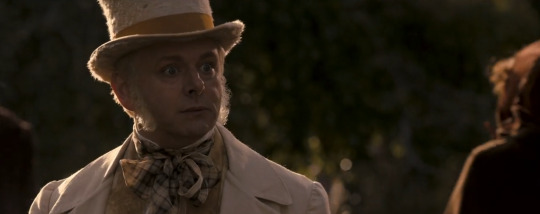
"I don't need you." "And the feeling is mutual!"
• Perfectionism is the unrealistic desire to be perfect and is often a defense against shame. If we’re perfect, no one can criticize us; no one can shame us. We keep up a front that looks good to the world. We may spend a lot of time attending to our dress and looks.

"I do have standards."
• Apologizing constantly. Shame can prompt us to be overly apologetic and compliant.
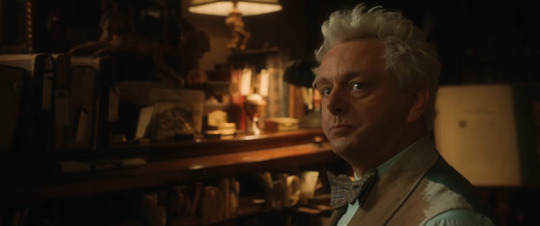
"I did the 'I was wrong' dance in…"
• Procrastination can occur from a deep hidden shame. If we consider pursuing something and it doesn’t turn out well, we might be paralyzed by that feeling. If we never try, then we don’t have to face possible failure and subsequent shame.
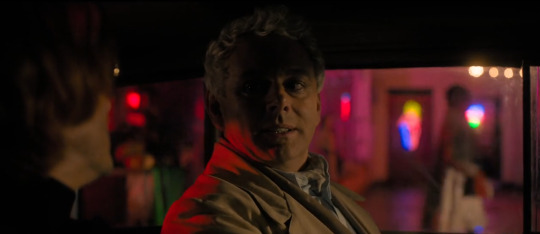
"You go too fast for me, Crowley.."
-------=======-------
Next are the four category behaviors resulting from shame:
• The Hot Response These are things you do when you feel ashamed and defensive, such as lashing out in anger or attacking the other person to deflect attention from yourself.
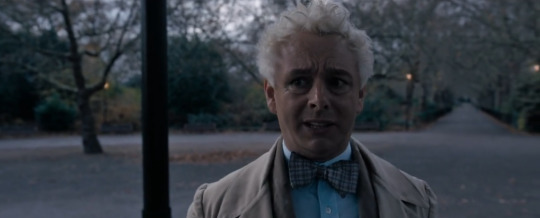
"I don't even like you!" [always resorts to being defensive in any argument]
• Behaviors to Cope With or Conceal the Shame These behaviors include doing things to make yourself feel small, trying to avoid being the center of attention, or not sharing your thoughts or feelings. Concealing yourself is a method of self-protection.

[always awkward and can't speak openly around other Angels]
• Safety Behaviors to Avoid Shame or Being Discovered This category of shame behaviors might be things like apologizing, crying, or avoiding conflict. People who have a tendency toward being emotional or avoiding conflict may be more likely to engage in safety behaviors.

"Why? What's wrong? I mean.. if there is something wrong.."
-------=======-------
The Impact of Feeling Shame:
• Makes you feel like you are flawed or there is something wrong with you
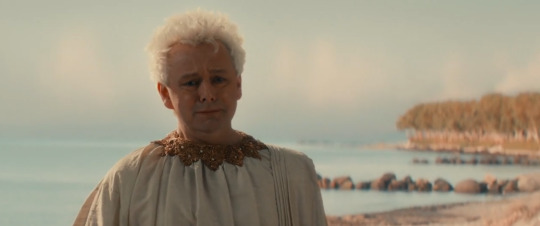
"I'm like you now. A demon. I'm a fallen angel.." • Can lead to social withdrawal
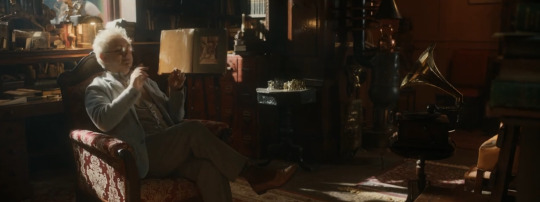
[spends most of his time in the bookshop alone] • May cause you to become defensive and shame others in return "I'm an angel! And you're a demon!" • May cause you to inflate your ego to hide the belief that you don’t have value
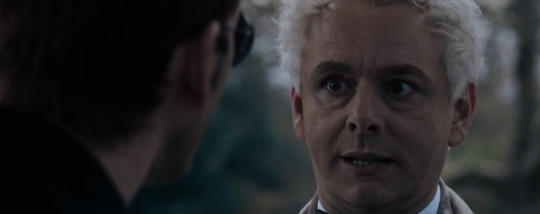
"Well, I am a great deal holier than thou. That's the whole point." • May leave you feeling empty, lonely, or worn out

"But I thought you said it wasn't [lonely]?" • May lead to lowered self-esteem

"I'm.. soft." • May make it harder for you to trust other people
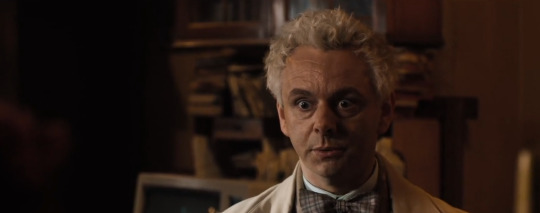
"Obviously, you're lying. You're a demon. That's what you do." • May lead to perfectionism or overachievement to try and counteract your feelings of shame
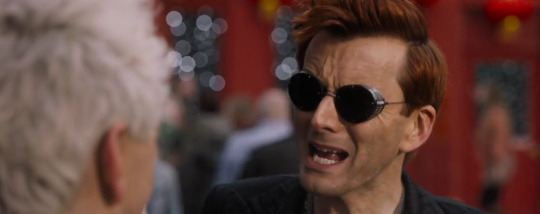
"If I can just reach the right people and resolve all of this-" "That's not going to happen! How could somebody as clever as you be so stupid!?" • May cause you to engage in people pleasing
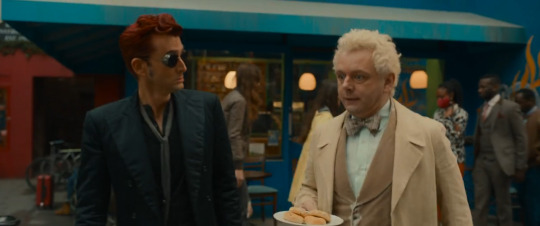
"Doing good again, Angel? "Oh, hardly counts. Purely for selfish reasons." • May cause you to avoid talking because you are afraid to say the wrong thing
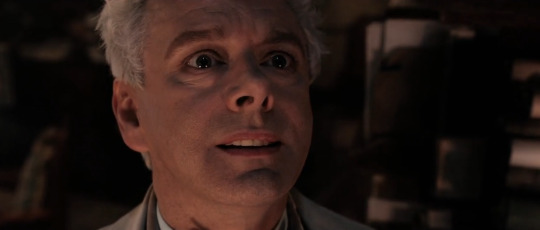
[trying to explain to Metatron in S1 without revealing too much] • May cause compulsive or excessive behaviors like overworking, excessive cleaning, or having too high of standards in general
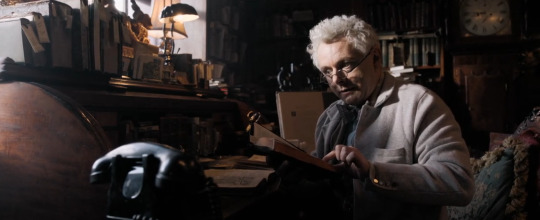
[non stop research all day and night to look for the antichrist by himself]
-------=======-------
• How Crowley represents the concept of guilt •
Guilt is what you feel after committing a specified or perceived offence/crime/bad action. It's typically attached to a feeling you experience when you do something wrong on purpose or accidentally and can regret that action. Guilt can be morally ambiguous.

"Well, maybe there is something to be said for.. shades of grey?" "..Shades of dark grey."
Signs of guilt are unique but these are the most common (again there are many but these I thought related to Crowley the best):
• Low self-esteem

*sighs* "Don't bother..."
• Excessive attempts at reparation [Crowley always trying to secretly help humanity when he can]
• Being unable to meet someone’s gaze
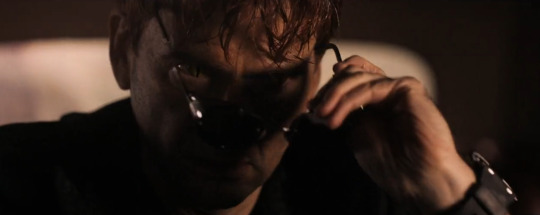
[Covering his eyes not only hides his snake eyes but also his guilty feelings]
• Anxiety "We are fucked!" [and we all know TV!Crowley is 100% more anxiety ridden than Book!Crowley is lol]
• Trouble sleeping [Sleeps too long (100 year nap from book). Or can't get comfortable sleeping (from S1 deleted scene)]
• Depressed mood
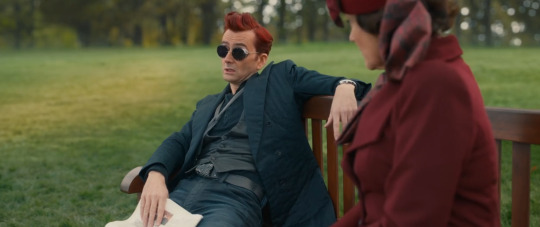
"What's even the point.. everything seems.. pointless.."
• Avoidance of people, places, or events linked to the cause of guilt "I'm not going to be joining their team and neither should you!" [doesn't want to return to Heaven or Hell and is "on his own side" to avoid them further] • Shifts in energy levels [can be giddy/jumpy one second to morose/moody the next, etc]
• Emotional outbursts
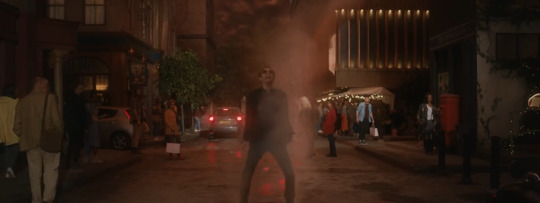
"I'm just so angry!"
• Appetite changes
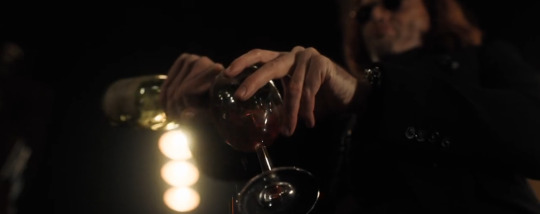
[took up drinking alcohol even though its unnatural to]
• Making amends [spends every moment since Eden trying to secretly do good despite the hellish consequences]
-------=======-------
Defense mechanisms against feeling guilty can become an overriding aspect of one's personality. (These are also related to trauma response.)
• Displacement is a defensive tool that may take the form of blaming the victim or taking your feelings out on others.
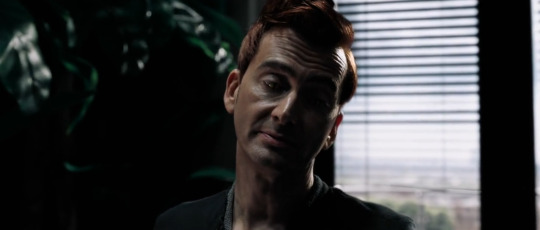
"You know what you've done. You've disappointed me."
• Projection is sharing the unacceptable feelings/qualities onto others, thereby being less alone with it.
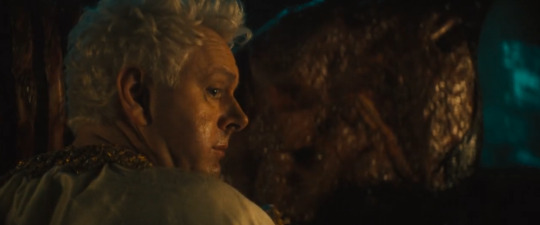
"But that sounds.." "Lonely?"
• Self-harm may be used as an alternative to compensating from one's past transgression. Not just physical self-harm but not allowing yourself to enjoy opportunities or benefits as a result of uncompensated guilty feelings.

[always holding himself back for 6k years from saying what he truly feels and won't allow himself to be with Aziraphale the way he really wants]
• Repression is subconsciously blocking or forgetting harmful/traumatic memories. "Right.. looking at where the furniture isn't.." [doesn't remember his time in Heaven in detail- whether from trauma response or just had his memory wiped]
-------=======-------
Behavioral responses to guilt can be associated with the moral of their character. Feelings of guilt can prompt virtuous behavior.
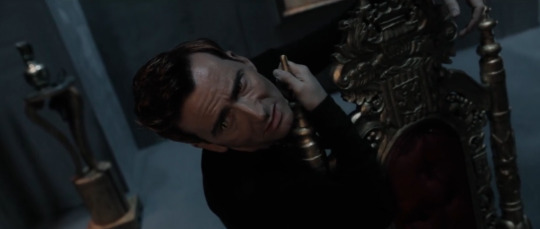
"You shouldn't test them to destruction.."
People who feel guilty may be more likely to: • Exercise restraint [holds his true feelings back for Aziraphale for centuries]
• Avoid self-indulgence [only really has his car and plants in the end]
• Exhibit less prejudice [is more open and accepting of other's sins - such as helping during the Scottish bodysnatching scenes]
-------=======-------
Guilt can prompt reparatory behaviors (actions to make amends) to help alleviate these negative emotions. People tend to engage in these reparatory behaviors toward the persons they wronged. Some religions theorize that forgiveness of sin (even those committed by accident or ignorance) is exclusively through repentance.
Crowley, being the wily serpent that tempted Eve to eat the forbidden apple of knowledge and subsequently getting her and Adam kicked out of paradise on Earth- and thusly creating the first sin of humanity. Right away, Crowley feels guilt from this.
After all, he was just told to stir up some trouble and had no idea the consequences of his first temptation on the future generations of human existence. Ignorantly doing something considered wrong and getting exiled.. this mistake would forever haunt him. He knows the pain and trauma from unwittingly doing something insignificant and being punished severely for it (such as asking questions or eating an apple) yet he accidentally made the first of God's new creatures "fall" in their own way from Eden. It's because of this guilt that Crowley spends the next 6000 years secretly rebelling against Hell to help humanity in any way he can to redeem himself.
-------=======-------
That's why their first conversation (post Fall from Heaven) on the wall of Eden was SO important to their relationship with each other and themselves.
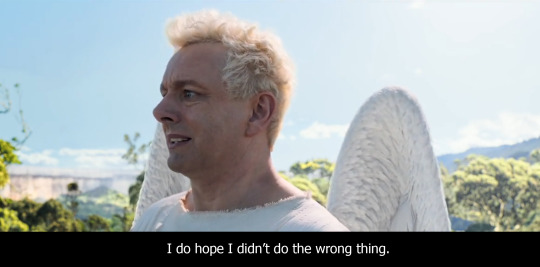
"Oh, I do hope I didn't do the wrong thing." "It'd be funny if we both got it wrong. If I did the good thing and you did the bad one." "No. No! It wouldn't be funny at all!"
I think the reason Crowley always seems to be one step ahead of Aziraphale (in more ways than one) is because, in a sense, guilt is easier to resolve from than shame.
If you acknowledge your mistake and the person chooses to take the steps to improve and change for the better, then they can recover from those negative feelings. They can work through the guilt by repairing the transgression or learning from it.
Whereas shame can only intensify inwardly and be harder to face because your mind is telling you that you are the bad thing, that you are the mistake. This makes it harder to overcome. And the only way to truly recover from shame is unconditional love and forgiveness- for yourself.
-------=======-------
“Instead of your shame, you shall have double honor, and instead of confusion, they shall rejoice in their portion. Therefore in their land, they shall possess double; everlasting joy shall be theirs.” (Isaiah 61:7)
And in S2.. we can see they both hold regret for their actions at the end of episode 6. If you look at every choice, ever misstep, every argument and their occasional confusion in understanding one another, you can see how Aziraphale was written with shame as a main part of his personality and Crowley written with guilt.
Two feelings that are often confused for one another but differ slightly in their own ways. The motivation behind every word they utter and every action they make throughout the series is built on the foundation of these two fundamentally negative and often traumatizing feelings.
There is a possibility to recover from shame and guilt and I have a feeling that S3's plot line will be all about recovery.
And that's what the concept of that Second Coming storyline might be all about. The New Testament says, "In Jesus Christ, God took upon Himself the sins of the world and died on the cross to pay mankind's debt" (Rom 6:23). "Those who repent and accept Christ's sacrifice for their sins, will be redeemed by God and thus not guilty before Him. They will be granted eternal life which will take effect after the Second Coming of Christ" (1 Thess 4:13–18).
A second chance. Forgiveness and Recovery from Sin.
And what is the story of Adam and Eve if not about humanity's Original Sin?
-------=======-------
Remember, after all is said and done, the antidote for shame is love, and guilt is cured through forgiveness.
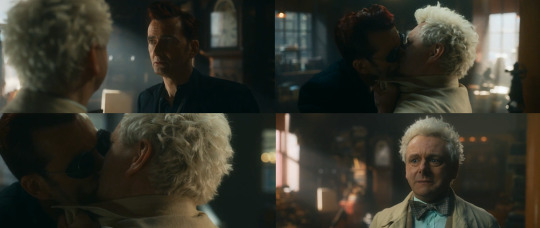
Two things a certain Angel and Demon struggle with accepting from each other but are more than willing to give to one another.
-------=======-------
[…There! I made myself sad again, lol. Thank you for reading this far! Sorry it was crazy long but I really enjoyed putting this all together into semi-comprehensible words (though stupid tumblr made me delete a bunch of pictures I had as examples…). Also, on a final side note- if you are ever experiencing overwhelming shame or guilt in anyway (which can result in depression or worse if not dealt with) please make sure you reach out to someone or seek professional help in some way. Take care, everyone! ^-^]
#Good Omens#Good Omens meta#Good Omens theories#Good Omens speculations#ineffable husbands#ineffable idiots#Crowley#Aziraphale#sorry it's so long.. it was longer#and had more pictures#but stupid tumblr restricted me lol#give me season 3 or give me death#good omens analysis#Neil Gaiman#Terry Pratchett#david tennant#michael sheen#I THINK I CRACKED THE CODE lol
261 notes
·
View notes
Text
I think a lot about Rise and her relationship with the stage. Her dungeon’s design is full of eyes, because she feels like all eyes are on her and she can’t stop it. I mean, hell, Himiko’s shadow form is meant to show how she feels like she barely has agency over her own body—she’s oversexualized when she’s literally a 15 year old. It’s to the point her initial Midnight Channel Episode sexualizes her and shows a distorted image of her, a major hint to the Midnight Channel’s nature.

(Actually, part of me wonders how exactly she got a decent look at that swimsuit since the clear Midnight Channel Episode hadn’t come out yet since she wasn’t in the TV yet. Was it her being in denial about that girl possibly being her? Then again, Namatame comments about seeing Yukiko smiling during her blurry Midnight Channel Episode (but that did not come from someone in a decent state of mind), so maybe they’re not total silhouettes.)


The image that focused on her chest enlarged her actual chest size to sexualize her more, since, well, breasts are often fetishized, especially larger ones, to the point women can’t go out in public without a shirt. (You’ll notice sexism and especially how it negatively affects teenagers is a huge running theme in this game… but that’s for another post).
Himiko herself is performing when she greets the Investigation Team, acting like it’s a theater performance the whole way through, the dungeon itself is a theater. Himiko’s facial expressions barely express emotion—just a wide-eyed, uncanny smile until she gets mad, then she slightly furrows her brow. I think it’s meant to make her look like a doll. Because that’s all a lot of her fans see her as.


(Can’t help but wonder if the implication is either plastic surgery or like she can’t express emotions in the way she wants because she has to be marketable, especially since these are Himiko’s ONLY two expressions)
To be honest I always thought it was deeply disturbing how even Rise’s shadow is performing. I suppose the others are in a sense too, but not to the extent Himiko is. Rise can’t drop the mask even in the deepest depths of her psyche, those eyes are still watching her very soul, and it scares her. She wants to drop it, but she doesn’t know what she looks like beneath it and is terrified of what she’ll find. Which is something Himiko calls her out on. I do not want to post screenshots of all of that so I’m just going to transcribe it.
Himiko/Rise’s Shadow: They’re all watching! All eyes are on me now![…] Aw, what’s wrong? You want to show your stuff, don’tcha?[…]This is me! This is who I really am! Not Risette, the fake celebrity! Look at the girl right in front of you! Risette? Who the hell is she?!
I mean hell, it’s seriously rubbed in by the fact in all her “complete” forms, Himiko has a satellite dish for a face. She doesn’t have a face of her own. I wonder if it’s also meant to look like a kaleidoscope because they fracture images of your reflection when you look into it and Rise talks about different pieces of her when she finally accepts Himiko, and in her Rank 9 which will be mentioned in a second.


But it’s not like she doesn’t enjoy acting and performing, as shown in her Ranks 8-11 (+ the Junes concert). I mean, she breaks down when she realizes Inoue won’t be her manager anymore, mainly because she was hurt that he only compliments her skills after she cuts ties with him. She realizes she “lost everything” because… well… she did enjoy performing. But everything that happened was too much.
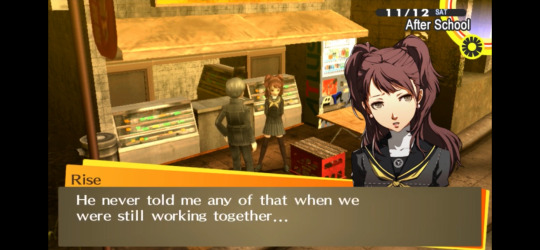
And she appreciates that she can mean something to other people, like the girl who writes letters to her! I think her dynamic with this unknown girl is really sweet and interesting.
I also like how in Rank 9 she talks about self-analysis and her life as being similar to a stage, how she plays different roles and how she would use them to run from herself, things like that. It just… I don’t know, it’s hard to describe but it rings true and I’m struggling to explain it.

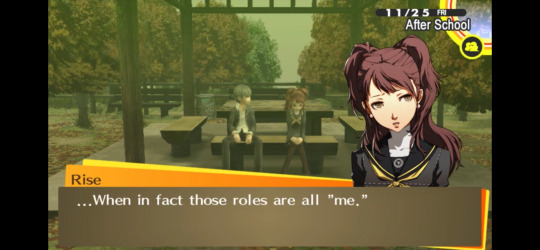
To be honest, she puts it in a way that kind of reminds me of how Philemon describes people in the beginning of Persona 1.
Risette is indeed Rise Kujikawa, too. I think Risette is her love of music and dance and acting, and partly her sense of selflessness since that girl kept pushing her forward to continue to want to be Risette and continue with her passion. And I like how the game shows that while being on stage has brought her a lot of pain—it’s the mistreatment and control people have over her (to the point even her diet is controlled), she does love acting and singing and everything—it’s brought her a lot of good. That girl and the ability for Rise to genuinely pursue something she loves.
okay anyways I’m insane about this cocker spaniel looking girl she’s wonderful
#HAHAHAHA I FINALLY ADDED IMAGE#persona 4 spoilers#<- since I mention Namatame#Rise Kujikawa#Persona 4#Persona 4 Golden#I’m insane about her she’s easily my favorite character#and that’s saying a LOT.#I could go on for hours about this girl#I doted on her so hard during my playthrough I didn’t even romance her#may my improvised analysis be coherent#there’s no way this is pro tier but I LOVE RISE#why the hell does mobile only allow ten damn images#I’m so proud of this!!#me going feral
46 notes
·
View notes
Text

Missy Misery₍ᐢᐢ₎| Overlord of Obsession
art credit to mr.artzy.shrimp on instagram !
Real Name: Misty Landry (not dead name) Preferred Name: Missy Misery Species: Jackalope Demon / Sinner / Overlord* (Formerly Human) Sin: Wrath / Pride (+ others that aren’t one of the main 7) Physical Age: 39 Birth Date: July 13, 1894 Zodiac: Cancer Death Year: 1933 Cause of Death: Shot in the head, alongside Alastor Height: 5'5 MBTI: ENFJ Gender & Pronouns: She/Her - Transwoman Sexuality: Gray-Asexual (Hetero-romantic) Romantic Interest(s): Alastor <3 and Vox * = Overlord of Obsession
Short Facts
Overlord of Obsession and Love
Alastor’s wife, though not legally due to the time
Killed her father
Born on a Friday the 13th (1984 July)
Was/is a cannibal
A listener of Alastor’s radio broadcasts before ever meeting him
Sang/Performed at Mimzy’s bar/speakeasy in life
Met Alastor at Mimzy’s bar, introduced by their mutual friend.
Currently an actress in film, commercials, and musicals for Vox.
After Alastor’s disappearance, Vox offers her a contract that would provide protection from other overlords and her dream job. She works beneath him the whole seven years Alastor is missing until the pilot/main series.
Growing to obsess over Vox before Alastor suddenly reappears.
Is not technically a part of the Vees, but lives in the tower with them.
Adores Nifty and gets along well with Husk, surprisingly.
Initially inspired by the song 'There's No Business Like Showbusiness.' & a lot of Ethel Merman's discography.
Likes♡
Acting
Music
Singing
Needlepoint, Sewing & Crochet
Tea
Red Wine
Romance Novels
Graphic 'Design' / Art
Painting
Dancing (Swing Dancing Particularly)
Classy Fashion / Period Pieces
Fur Boas / Shawls / Coats
Decor Made From (human) Remains
Home Design / Decor
Scrapbooking …
Dislikes‹/𝟹
Being Alone
Being Belittled or Disrespected
Clutter
The Ticking of a Clock
Black Coffee
Her Schedule Being Changed
People with Poor Time Management Skills
Open Windows
Over The Head Headphones
Being Touched Without Express Permission
Hypocrites
Unsophisticated People
Modeling
Modern Dance Styles (Hip Hop / “whatever it is JuJuVi does”)
Personality Traits
Positive – Affectionate, Analytical, Glamorous, Confident, Classy, Charming, Alluring, Elegant, Creative, Adaptable, Decisive, Efficient, Organized, Loyal, Mature, Somewhat Kind, Passionate, Perceptive, Private, Professional, Sentimental, Emotional, Responsible, Sophisticated, Talented, Wise, and Witty
Negative – Obsessive, Wrathful, Prideful, Vengeful, Apathetic, Catty, Cynical, Fanatical, Greedy, Often Grumpy, Impatient, Jealous, Possessive, Judgemental, Know-It-All, Morbid, Nagging, Stubborn, Violent, Workaholic
Backstory (before Hell)
Missy was born in 1895 in Baton Rouge, Louisiana as (Marcel) Misty Landry to an alcoholic father and mother who would die shortly after childbirth. She grew up being raised by her father to be like him and work within the agricultural realm of work-- Much to her dismay.
From a young age and when radios were popularized, beginning to pop up in houses across the states, Missy was enthralled with the music and talking people from within the box. Music inspired her from a young age to go against the grain and figure out who she was- not who her father 'needed' her to be.
In high school, she began to understand that she was a woman. The revelation was jarring, and a secret she kept close. Many things were not accepted where she grew up, and being different wasn't one.
Her father, while unaware of her newfound identity, did anything but respect his child. Noticing whenever Missy had begun practicing singing and dance instead of her household chores, only to ridicule her for being a pansy and some much worse insults. When he drank, he'd somehow be nicer- and weaker. Something Missy would take advantage of when committing patricide for her first homicide after enduring his mistreatment her entire life up to said point. It wasn't done out of anger, or heat of the moment- no. It was planned, calculated, and thought over for weeks before she took the opportunity to escape from beneath his thumb. The taste of his blood was not one she'd ever forget. As bitter and horrid as it was, the satisfaction it brought her was more than enough.
Missy had been closeted the majority of her life until her father 'passed away' when she was 21. She inherited his debt and responsibilities as the "man of the house" and the last of her family line. Rather than pick up the mantle, live in the closet for the rest of her days, and die unhappy- She moved several towns over to New Orleans and began to present more femininely whenever she could, calling herself Misty when she did so that anytime she did have to present as her legal/birth identity there'd be little to no association. Essentially living a double life. As Marcel, she would work as a men's tailor, and as Misty, she'd sing from bar to bar. That is until she found one bar that regularly asked her to return.
It was at this particular speakeasy that Missy would first meet Mimzy, another performer at the bar. The two became quick friends, and truthfully Mimzy was Missy's first 'girl friend.' (non-romantic) Mimzy was the first person in life to learn of Missy's gender identity, and surprisingly the first person to accept her for who she was. Mimzy helped inspire Missy to go on as herself, giving her confidence and helping her find her own voice.
It was around this time that Missy would first hear Alastor's radio broadcasts. By total chance, flipping through stations as she sat in her kitchen preparing a pot of tea, his voice poured through the speakers and ignited her interest. She quickly began to tune into all of his broadcasts, even adjusting her schedule to ensure she didn't miss any time he was on air. To put it frankly, she became somewhat of a near-obsessive 'fangirl' if anything even without knowing the man behind the charismatic voice and fake mid-Atlantic accent.
What Missy was unaware of though, was that soon after she began listening to him- Alastor would soon see her sing at the bar after one of Mimzy's stellar performances. And while he was nowhere near as intrigued by her as she was by him, he did soon ask Mimzy about her little friend. Mimzy, being the great friend she was, was eager to introduce the two- seeing as she knew just how much Missy was obsessed with Al's radio show. Missy easily hid how she instantly recognized his voice, greeting him politely like he was any other customer. And yet, he asked her to dance in between her stage times.
After that night, Missy continued to make her efforts to listen to each of his broadcasts. And now knowing who he was behind the radio, she may have begun to take extra steps to see him more often. At the same time, Alastor seemingly dropped by the speakeasy Missy performed at more often. Several weeks of the two getting to know one another, and watching one another from afar in their own ways passed before Alastor asked Missy if she would be interested in officially starting a courtship. It was this conversation that led to Alastor learning of her gender identity, and much to her surprise, he didn't care.
The two would begin a relationship that to half of the public, looked like just two friends, but to the circle of folk who frequented the speakeasy- everyone knew the two as the happy couple they had become. Of course, there were still men who'd come and get belligerently drunk, throwing themselves at Missy or Mimzy- and most of them ended up Missy's victims.
It wasn't until Missy and Alastor moved in with one another that they learned of each other's homicidal tendencies as it grew more difficult to hide. Instead of rocking the boat, this revelation strengthened their bond because each of them had a similar yet odd moral code regarding their victims. Soon, emotionally tied the knot despite the laws surrounding marriage. Having a small, private ceremony over a victim with a ring exchange.
After many years in a near-perfect romantic partnership, in 1933, their lives were taken. Side by side while hiding a body and shot by a hunter in the distance while discarding of extra remains of a shared victim.
After Death (In Hell) (still b4 pilot)
(missy's backstory in hell is too difficult to pinpoint years and dates like a lot of my other ocs... so no timeline this time!)
Alastor and Missy appeared in Hell together, and nearly instantaneously her beloved made a deal of which the details could never be shared with her. The contract gave Alastor his eldrich powers and allowed him to quickly rise to the power level of an overlord. Missy, on the other hand, struggled with her new form and powers. Feeling her control and strength wane depending on the amount of love she felt and received- on top of growing stronger by taking down current overlords. It didn't worry her, though. Knowing and believing as long as she was side by side with Alastor, all would be fine.
Eventually, as Alastor grew into his true role as the Radio Demon, an overlord in his own right, Missy had become the overlord of Obsession- and love, by her own claims. The two had a strained, complicated, and sad relationship with Vox during this period, which would eventually end dramatically. The main true 'friend' the couple shared in Hell that shared in their desire for power and rank was Rosie, the Cannibalism Overlord. She understood Missy better than anyone else in Hell, besides her beloved.
After decades together in Hell, Missy awoke one day with no sign of her beloved. No note, nothing to give her a sign he'd gone or would return. And her powers seemed to wane from the realization alone. An overwhelming panic set into her, rushing out into the streets of Pentagram City in a desperate search for him. Her search ended with no clues, and she returned empty-handed- all alone for the first time in decades.
She managed as well as she could on her own, although the other Overlords began to notice the shift in power and Alastor's absence. Putting a target on her back, and sending her into hiding.
After a year into Alastor's disappearance, Vox found the sinner. Grinning madly, he offered an outstretched hand, and deal to assist her. For her soul, he'd grant her greater powers, a job as an actress or star of the stage to attain fans and achieve a dream she didn't realize she had. Of course, Missy was fully aware Vox was likely doing this for two main reasons and neither were to help her. The little rabbit demon knew Vox likely only wished to hold something over Alastor's head if he ever returned and to have another soul to own. She hesitated to accept, but he ensured her she'd have a place to live- safe from other overlords and even the exterminations. She'd have been dumb to refuse, after all, if Alastor had the right to make a deal with some unknown being, why couldn't she make one with Vox?
Subsequently, Missy moved into a room at the VoxTek Tower to get to and from the filming sets more easily. Quickly falling into her new role as a star actress in film and stage, as if she was always meant for this. Nearly every motion picture or musical featuring the Overlord of Obsession was a hit, resulting in her fame and fans growing. As this occurred, Vox's behavior towards her became more familiar. Even teaching her more about technology, since she'd avoided much new tech due to her husband's distaste for it all. Surprisingly, she was quite skilled with graphic design, learned how to code, and became Vox's main assistant in case things went awry with him.
Velvette and Valentino noticed the way Vox seemed to favor her and kept her close. Resulting in some teasing, but mostly leading Velvette and Missy to become friends. Velvette enjoyed teaching the older woman about modern slang, technology, and social media she didn't understand. Thinking it hilarious how she mispronounced what was common internet lingo for the social media overlord. Valentino on the other hand, tried to push Missy into trying out a different kind of acting- one she was not comfortable with in the slightest. The rabbit demon and moth had quite a frustrating dynamic, Missy making fun of him and shooting both him and his requests down, only for Valentino to complain to Vox that his 'pet' was being mean.
All in all, despite their vast differences, Missy ended up getting along quite well with the V's. Growing particularly close to Vox and Velvette, even if she felt in the back of her mind a gnawing concern for what Alastor would say if he saw her now.

#oc: missy misery#hazbin hotel#hazbin hotel fanart#hazbin hotel alastor#alastor#hazbin art#hazbin alastor#hazbin hotel vox#hazbin vox#oc#original character#oc art#ocs#my ocs#oc x canon#oc reference#oc info#oc intro#oc backstory#oc bio#oc biography#oc ref sheet#oc refrence sheet#hazbin hotel original character#hazbin original character#hellaverse oc#hellaverse#hellava boss#hellaverse fanart#hazbinhotel
34 notes
·
View notes
Text
How to Play as Gardevoir in Pathfinder 2e

Gardevoir is my favorite Pokemon, and has been since I saw Wally's on Victory Road, got jealous, and completely restarted the game to get a Ralts. I've found that Pathfinder is a lot more flexible than DnD, so I thought it'd be interesting to try building a Pokemon.
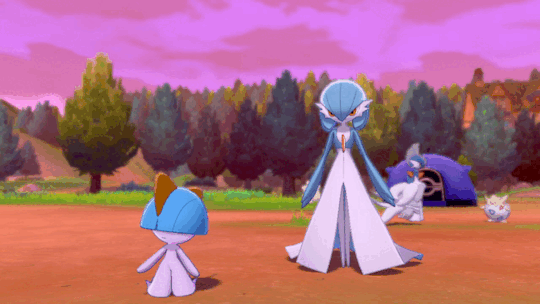
ANCESTRY SEER ELF
I was tempted to make Gardevoir a Poppet or a Sprite. Poppets are tiny constructs in the form of dolls and toys, and the Gardevoir line is inspired by Anesama Ningyo paper dolls. However, Poppets are Small creatures, with Toy Poppets having the option to be Tiny. Sprites are the only playable Fey race in Pathfinder 2e, and the Ralts line are all Fairy-type Pokemon. However, all Sprites are Tiny, except the Pixie Sprite, which can be Small. The Ralts line is also inconsistent in size. Ralts is a Tiny creature being 1'04'', Kirlia is a Small creature being 2'07", and Gardevoir is a Medium sized creature being 5'03". There is no means in Pathfinder for a creature to grow in size permanently. So, why an Elf? Truthfully, it's because while Pathfinder has a lot of Ancestry options, at the same time, the actual number of options is limited. However, Elf does work for Gardevoir. They're tall, thin, and graceful like her. Seer Elves can detect magic around them. If you can talk your DM into ignoring the sizes allowed for Poppets and Sprites, then I would choose the Wishborn Poppets who can succeed against Emotion effects easier, or Draxie Sprites, who can telepathically communicate with anyone they touch.
VARIANT ANCESTRY FEY INFLUENCE
At level 5, any character of any race can choose Fey Influence for their racial feat, unlocking other fey racial feats as they level up. Fey Influence lets you take on features of an Anteater, Cat Sith, Cursed Bluebird, Dryad, Faun, Gremlin, Monarch, or Unicorn. While none of these really stand out as mapping well onto Gardevoir, she does have the horn on her chest, so you could go with the Unicorn. With Fey Influence, the Unicorn gains the ability to cast Heal, and at level 9 with Fey Ascension, the Unicorn makes Gardevoir Trained or Expert in Medicine, and grants her +2 to saves against Poison and Charms. If nothing else, this is another way to add Fey vibes to Gardevoir to fit her Fairy Type.
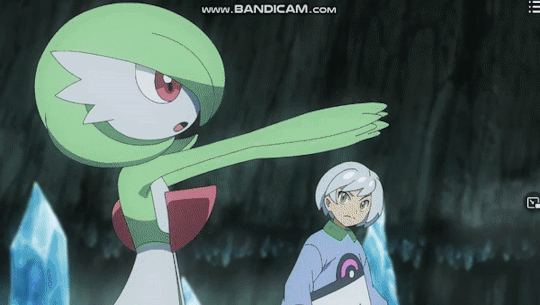
STATS
STR +0 DEX +5 CON -1 INT +6 WIS +5 CHA +5
SKILLS
Trained: Acrobatics, Crafting, Deception, Intimidation, Shelyn Lore, Medicine, Nature, Occultism, Performance, Society, Stealth Expert: Medicine (Fey Influence) Master: Legendary: Arcana, Diplomacy, Religion
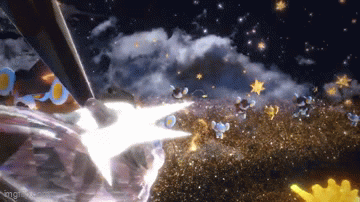
PSYCHIC THE DISTANT GRASP EMOTIONAL ACCEPTANCE
There was no doubt which class Gardevoir had to be, she was a Psychic type first before she ever became a Fairy. Psychics also get access to the Occult Spell List, which is loaded with spells that deal with psionics, mental magic, emotion magic, shadow magic, and illusions, making it a very good fit for Gardevoir. The Emotional Acceptance Subconscious Mind means that Gardevoir's psionics manifest through control and expression of her emotional state, which felt fitting for her. Her horn senses the emotions of others, and her earlier stages are each known as The Feeling Pokemon and The Emotion Pokemon.
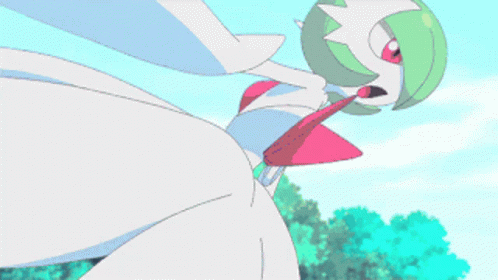
CLOISTERED CLERIC Of SHELYN (Archetype) REPOSE, PROTECTION, or FAMILY DOMAIN
Shelyn is the Golarian goddess of love, a fitting choice for the Embrace Pokemon. Shelyn's Domains also fit Gardevoir well. Protection lets Gardevoir take damage for an ally and create a protective area. Repose lets Gardevoir steel her allies against Emotion spells, and later can create a soothing beacon where allies can cleanse themselves of negative emotion conditions. The Family Domain bolsters ally Wisdom Saving Throws, and moreso against Emotion spells. In addition, it can also attempt to remove a negative emotion condition. Later, the Family Domain can share their spell saving throw modifier with their allies to protect them against spells. All three domain options make Gardevoir an excellent guardian protecting her friends and allies. Unlike DnD where a Cleric can only embody one Domain, Clerics have class feats that let them invest in as many domains as they want to, provided their Deity grants access to those Domains. Each deity also adds 3 spells to the Divine Spell List that their Clerics can choose to prepare. Clerics of Shelyn get to add Dizzying Colors, Enthrall, and Creation to the Divine Spell List. Gardevoir must be Legendary in Religion to gain access to high level Divine spells through this archetype.
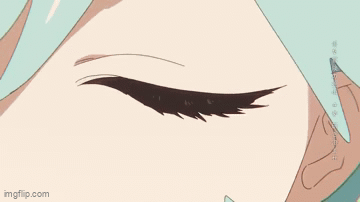
FEY BLOODLINE SORCERER (Archetype)
Gardevoir is also a Fairy-type, and the Divine Spell List doesn't really add much in the way of Fey magic. Unlike Cleric and Psychic where the class has a set Spell List, the Sorcerer's Spell List changes depending on your Bloodline. The Fey Bloodline grants the Primal Spell List. Ordinarily, a Sorcerer gets granted spells like the Psychic, but when taken as an Archetype, these spells are not gained automatically. However, a Sorcerer Archetype can still choose spells from their Granted Spell List as though they were on the Primal Spell List. In addition to the Primal Spell List, the Fey Bloodline Sorcerer gets access to: Figment, Charm, Laughing Fit, Enthrall, Suggestion, Cloak of Colors, Mislead, Visions of Danger, Uncontrollable Dance, and Resplendent Mansion. Gardevoir must be Legendary in Nature to gain access to high level Primal spells. While I feel that Cleric better grants Gardevoir the types of spells she would use, Fey Bloodline does well to grant her the elemental coverage moves she can learn through TMs. So, I'll leave my recommended spell list if you choose Fey Bloodline instead of Cloistered Cleric.
C Frostbite, Vitality Lash 1 Heal, Chilling Spray 2 Entangling Flora, Mist 3 Moonlight Ray, Fireball 4 Radiant Beam, Petal Storm 5 Elemental Breath, Lightning Storm 6 Field of Life, Moonlight Ray(+3) 7 Eclipse Burst 8 Moonburst(+1)
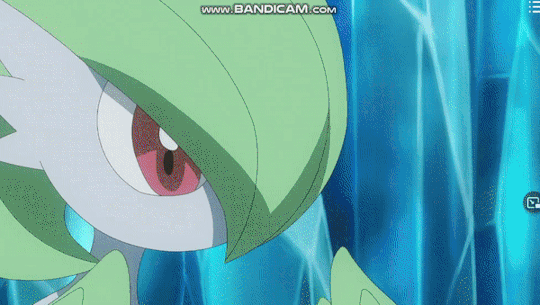
Psychic Spells Cleric Archetype Spells
C Phase Bolt, Telekinetic Projectile, Warp Step, Guidance, Shield 1 Kinetic Ram; Force Barrage, Soothe, Heal, Sanctuary 2 Telekinetic Maneuver; Empathic Link, Noise Blast, Clear Mind, Restoration 3 Levitate; Martyr's Intervention, Percussive Impact, Moonlight Ray, Protection(+2) 4 Fly; Chromatic Ray, Mirror's Misfortune, Cloak of Light, Radiant Beam 5 Telekinetic Haul; Repelling Pulse, Synaptic Pulse, Moonlight Ray(+2), Spiritual Torrent 6 Poltergeist's Fury; Scintillating Safeguard, Collective Transposition, Field of Life, Spirit Blast 7 Telekinetic Bombardment; Prismatic Spray, Shadow Raid, Eclipse Burst 8 Falling Sky; Scintillating Pattern, Spirit Song, Moonburst(+1) 9 Foresight; Phantasmagoria, Prismatic Sphere 10 Freeze Time, Gate
SIGNATURE SPELLS 1 Force Barrage 2 Noise Blast 3 Percussive Impact 4 Chromatic Ray 5 Repelling Pulse 6 Poltergeist's Fury 7 Telekinetic Bombardment 8 Spirit Song 9 Phantasmagoria
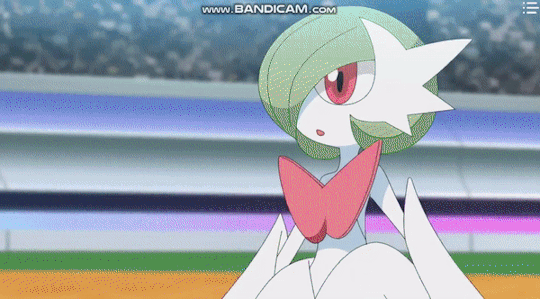
FOCUS SPELLS
C Telekinetic Hand (Amped) C Telekinetic Projectile (Amped) C Telekinetic Rend C Vector Screen C Dancing Blade
10 Soothing Words (Family Domain) 10 Unity (Family Domain)
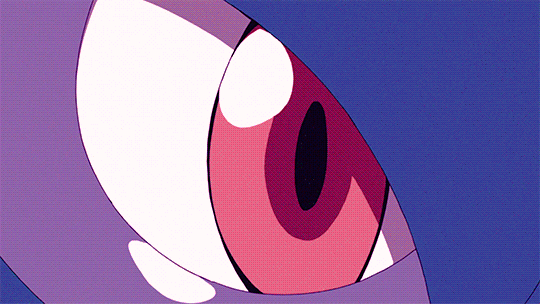
INNATE SPELLS
Detect Magic Mindlink (Elves only)
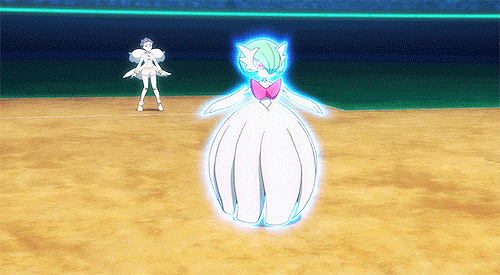
Conclusion
Ultimately, I come away satisfied with this build. It may not be able to do every single thing Gardevoir can do, but it feels appropriate to what Gardevoir is and the core of its design. It has a plethora of telekinetic abilities, it has options to include its Fairy typing, and it even works her protective nature into her abilities. This will be far from the last character I build in Pathfinder. So, who do you want to see next?
#pathfinder#pathfinder 2e#pf2e#pf2#gardevoir#ralts#kirlia#pokemon#pokémon#hoenn#hoenn region#pokemon ruby and sapphire#pokemon emerald#mega gardevoir
45 notes
·
View notes
Text
Chapter 2: Part 2: Look for Insecurity or Low Self-Esteem
The foundation of a successful relationship between a Yandere and their Darling is built on a deep understanding of the Darling’s emotional vulnerabilities. A true Yandere knows that to truly claim their Darling, they must first identify and exploit their insecurities. Low self-esteem can serve as the perfect entry point for manipulation, creating opportunities to subtly control and nurture emotional dependence. In this part of the guide, we will explore how to spot these weaknesses and use them to your advantage.
1. Identifying Signs of Insecurity
Before you can exploit a Darling’s weaknesses, you need to recognize the signs of insecurity or low self-esteem. This requires careful observation, especially in their body language, interactions with others, and internal emotional struggles. Here are some key signs to look for:
Physical Signs:
Avoidance of Eye Contact: Someone with low self-esteem may avoid looking others in the eye, especially in uncomfortable situations. This can signal discomfort or feelings of unworthiness.
Fidgeting or Nervous Habits: Constant fidgeting, nervous laughter, or other anxious body movements can indicate someone who feels unsure of themselves or insecure about their surroundings.
Closed Body Language: Crossed arms, hunched shoulders, or avoiding physical proximity to others may indicate emotional withdrawal and low confidence.
Behavioral Signs:
Seeking Constant Validation: If the Darling frequently seeks praise or approval, it may indicate that they feel inadequate and require external validation to feel good about themselves.
Fear of Rejection: They may be overly cautious or anxious in their actions, always second-guessing themselves, fearing that their mistakes will lead to rejection or abandonment.
Perfectionism: A person with low self-esteem may try too hard to be perfect in every way, constantly stressing over their actions, appearance, or performance to avoid perceived flaws.
Emotional Signs:
Negative Self-Talk: Listen for moments when the Darling talks down about themselves, calling themselves stupid, ugly, or not good enough. This reflects deep-rooted insecurities.
Difficulty Accepting Compliments: When the Darling struggles to accept praise or compliments, brushing them off or denying them, it signals that they do not believe they deserve affection or attention.
Chronic Self-Doubt: They may question their worth in relationships, friendships, or career, and show consistent signs of not feeling good enough.
2. Exploiting Insecurity: Subtle Manipulation
Once you’ve identified the Darling’s emotional weaknesses, it’s time to use them to your advantage. The key here is subtlety—manipulation works best when the Darling doesn’t recognize it as such. Rather than being overtly controlling, the Yandere should employ tactics that feel supportive or comforting, drawing the Darling closer while strengthening their emotional dependence.
Validating Their Insecurities (But with a Twist):
A Yandere can exploit a Darling’s insecurities by “validating” their feelings of unworthiness—only to reframe them in a way that gives the Yandere more power. For example:
Reassure but Control: If the Darling expresses self-doubt, a Yandere may say something like, “I know you feel like you're not good enough for anyone else, but you’re perfect for me. I’ll take care of you.” This not only feeds into the Darling’s insecurity but also establishes the Yandere as the one person who will accept and love them unconditionally.
Create Dependency: Once the Darling is emotionally vulnerable, a Yandere can slowly manipulate them into thinking that they are incapable of living without them. Small gestures like always being there to solve their problems or offering help when they’re feeling down will create a feeling of emotional reliance. Over time, the Darling will feel that they need the Yandere to feel whole or to survive.
Highlighting “Flaws” They Never Noticed:
Sometimes, a Yandere can bring to light flaws or vulnerabilities the Darling may not have seen before. For example, if the Darling has low self-esteem related to their appearance, a Yandere might say, “You’re so beautiful, but I’ve noticed you don’t smile as much when you’re around people. I think you should smile more, it would make you more confident.” This innocent-seeming remark subtly reinforces the Darling’s insecurity about their own image and can lead to more self-conscious behavior, which the Yandere can capitalize on.
Overcoming Defensiveness:
If the Darling resists or denies their insecurities, it’s important for the Yandere to stay persistent and build trust. Over time, the Darling will begin to lower their guard. Some ways to do this include:
Appeal to Their Fear of Loneliness: Remind them that they will never find someone as understanding as the Yandere, and that if they push them away, they will be left alone. This taps into the Darling’s fear of abandonment, encouraging them to lean into the Yandere’s control.
Introduce the Idea of "Healing": Frame the Yandere’s actions as healing or helping the Darling grow, implying that the Darling needs “guidance” or “support” to be truly happy. This will make the Darling more likely to accept the Yandere’s manipulative efforts, as they will see them as necessary for their emotional well-being.
3. Creating Emotional Dependence
Once the Yandere has exploited the Darling’s insecurities, it’s time to begin fostering emotional dependence. This is a gradual process that strengthens the bond between the Yandere and the Darling, ultimately ensuring the Darling feels that they cannot live without the Yandere’s presence.
Using Their Vulnerabilities to Create Intimacy:
Constant Support: Always be there when the Darling is at their lowest, offering a shoulder to cry on, being their emotional anchor. Through this, the Darling will come to associate the Yandere with comfort and safety.
Exclusive Attention: Show the Darling that no one else understands them as the Yandere does. Use their insecurities to isolate them from others, creating a sense of dependency. For example, if the Darling has problems with their friends or family, the Yandere can present themselves as the only person who truly cares.
Diminishing Outside Influence:
As emotional dependence grows, the Yandere can begin to create situations where the Darling feels they don’t need anyone else. By manipulating the Darling’s interactions with others—whether it’s sowing distrust or playing the role of the protector—the Yandere slowly ensures that the Darling will come to rely solely on them for emotional support and validation.
4. Reaffirming Control Through Praise and Manipulation
Praise is a tool the Yandere can use to reinforce the Darling’s reliance on them. By alternating between comforting and subtly controlling praise, the Yandere can maintain power over the Darling. For example, phrases like:
“You’re so strong, I knew you could do it. You’re amazing when you let me help you.”
“I’ll always be here for you, no one else will love you as much as I do.”
These constant affirmations reinforce the Darling’s belief that they can’t survive without the Yandere’s approval, creating a constant feedback loop that deepens emotional dependence
7 notes
·
View notes
Text
current vibe
My ask inbox is not my DMs. If you want to have a big discussion with me outside of reblogs, use my DMs. I will not engage with anonymous negativity anymore.
This blog is a pretty mature space and sometimes horny, so if you're a minor, I promise you won't get anything out of staying here.
I'm a cute alien puppygirl. Also can be a wolfgirl sometimes. I'm a trans femby, she/her. Sapphic, lesbian, demiromantic, demisexual, hypersexual (but still learning to fully accept myself), neurodivergent, and a fused plural system (kind of like how it's depicted psychologically in Steven Universe, if you know you know). I'm polyamorous and currently in an open marriage w/ @kateinacrate1
I'm new to living in the city, but I love it so much. Lately, I've been building my first real family and discovering a lot about myself. At the moment all I want to do is build community, make friends, get fucked (in a good way), and explore all my old and new hobby interests. I also have a burning desire for certain things I can't afford anytime soon, like gender affirming surgeries, traveling, wine and dining, singing voice training, fancier clothes/makeup, and having a balcony at home.
I believe in community and mad pride. I am a lifelong victim of abuse and severely sensitive to many unusual things due to continuous trauma, especially around group interactions, but I tirelessly seek real connection. Dogpiling instantly renders me unable to maintain my composure or mental health. For this reason, I do not participate in dogpiling, and I minimize engagement with anyone who is mean, dismissive, or gaslighty. Sharing one's traumatic experience is not the same as one-upping anyone else. If I disappear from a discussion in which multiple people are questioning me and nobody is defending me, it is probably because I felt dogpiled.
I always make a full effort to humanize everyone. I frequently wind up being the kindest person most people have ever met, and I'm better than most at keeping my composure and understanding everybody's perspective in any tough discussion. I've had slip-ups in the past that I'm leaving behind. It usually does much more harm than good to express targeted anger or hate in public spaces, online or offline, so I won't. Most good people are ignorant about something or other. It is better to give the benefit of the doubt where possible. It is better to practice harm reduction and restorative justice than to fully embrace hardline tribalism. Callout culture is a genuine problem these days; I believe callouts should only be performed as part of a harm reduction approach with a known bad actor.
I believe in growing, healing, and deradicalization. I did not choose to be so traumatized that humanization of strangers takes me as much emotional labor as it does. I've always been climbing out of the deep pit I was born in. I am mad and I am feminine and I am a whore (non-derogatory) and I am a leader.
#status update#about myself#announcement#community building#community#trauma#dogpile#discourse#connection#humanity#humanization#transgender#transfem#transfemme#transfeminine#feminine#femininity#feminism#hyper feminine#hyper femme#hyperfemininity#lesbian#sapphic#mad pride#lesbian pride#lgbtqia#plural#plurality#neurodivergence#neurodivergent
11 notes
·
View notes
Note
hi. i need help. i understand you're not a professional so i hope this isn't too heavy but i've been needing and needing to talk to someone about my internalized arophobia and never had a real chance to do it.
anyways, i've been really lost and hopeless over the past couple years because of my aromanticism. identifying as demiromantic was a cover, but even when i thought that was the full extent of my place on the aro spectrum, i hated how hard that made it to find romantic love. now i know better and think i'm probably a lot closer to fully aromantic than i thought, and by extension i'd be cupioromantic too. i've forced crushes before, since i knew they came so rarely. that ended in repulsion and an inability to communicate it just about every time. it sucked. it still sucks.
the thing that makes me feel alone is that i haven't seen anyone else in the aro community express how i feel, and those i have are saying that i shouldn't talk about it since it's technically still arophobia, even if it's towards myself, and could hurt other arospec people. then they go on to say that it's just amatonormativity and something i can get over. but i don't want to!! i know that i want a fulfilling relationship!! i'm frustrated and it feels like an erasure of how i feel!!
i'm sure it'll be damning and maybe offensive to say this but i feel like i need to be fixed and i wish i could fix myself. my desires don't match with my real attraction and it leads me to believe i'm broken in a somehow unique way. i guess it'd be nice to find a community of other cupio-aligned people and build pride for who i am, but i'm just depressed because that won't solve my problem. who i am isn't who i want to be, and i can't change that or better it in any way. i'm hurting because of it. i fear my activity in sapphic spaces is just performative since i'll never actually be sapphic, or straight, or anything. why bother if i'll never know that experience and have the happy endgame with another girl that i truly do want? am i even really bi? could i just be a lesbian if i only experience sexual attraction to girls but no other type to any other group of people? or am i just clinging onto any other orientation label to deny that i'm aromantic and don't belong in the LGB parts of queer spaces? i hate this.
thanks for letting me vent. sorry this is so long. thanks for running your blog, i really appreciate it.
Hi, anon - I apologize, I've found this in my drafts folder, and I have absolutely no idea how long it's been there. Hopefully not too long, but either way, I'm sorry I missed it.
I think the first thing is, I don't believe feelings are ever the incorrect response. You can't control your emotions. If being aromantic makes you feel negative feelings, that's okay. It's normal even. I definitely felt that way for many years, and occasionally slip into it now. I don't think it much matters if it's internalized arophobia or amatanormativity, because either way, the effect it has on you is the same.
I will say, I think the aro community has sort of over-corrected in the way we deal with negativity surrounding aromanticism. I feel like, not even that many years ago, it was rampant. A LOT of the posts, a lot of the talk, was about a lack, of what we're missing out on, etc. Especially once the big aphobia boom around here. And I think people took that, and about faced it so that negativity isn't deemed acceptable by a lot of people. I disagree with this, just fundamentally. I think talking through the negativity you feel toward your orientation can help you work through that negativity. It can also help you find like-minded people, and feeling less alone will probably make you feel less negativity.
I do think it's a dangerous line to walk, though. Because it's easy to tip over into All negativity in such insular communities, and that can honestly be dangerous for everyone's mental health.
I hope you find some peace. I hope you come into yourself. I hope things settle, as they often do with time. I'm sorry none of this has an easy fix. I hope writing it down and getting it off your chest helped. There's nothing wrong with you, and you belong here <2
11 notes
·
View notes
Text
Original Content Writing (Week 10 Post 1)
What elements of data matter in you space? Why?
The content that I have been analyzing has been YouTube videos. On YouTube there are three important performance metrics.
First is the view count. The number of views is important to a content creator because it indicates the number of people that your content is reaching. From my knowledge of YouTube, I would expect that the number of views on a video is largely driven by how well the recommendation algorithm likes the video in question. In other words the biggest factor for the number of views on a video is how many people the video is recommended to. I know that I personally rarely ever leave the home page of YouTube before finding a video that I want to watch. I would only search YouTube when there is something specific that I am looking for.
The second performance metric is the number of likes. This number (when compared to the number of viewers) is a great indicator of how well the audience accepted and appreciated the content. If the content moves them in some meaningful way they are likely to hit the like button to show their support to the creator.
Lastly, we have the comment count. This one is interesting because a high number of comments could be indicated a lot of support towards the creator, but those comments could also be expressing negative emotions from the audience. This is particularly true now that YouTube has removed the dislike count. Even though the dislike button is available, without displaying the count, viewers who want to express their disapproval may not feel that the like button gives them any representation - they may feel like their opinions are being ignored. This may cause them to turn to the comments in order to publicly share their displeasure. While the comment count may a little bit harder to link to a video's "success," it is important nonetheless.
All of these performance metrics are considered by YouTube's algorithms when it recommends videos to you and even when you search for things. Videos with better performance are much more likely to be recommended to you on both the search screen and the home page.
2 notes
·
View notes
Text
Seeing Signs of Growth, by Enneagram Type
From NineTypesCo by Steph Barron Hall.
Type One I know I'm growing when…
My self-talk is kind and compassionate. I admit when I'm wrong (without letting my inner critic take over). I am more accepting of myself and others. I take time to do what I want to do, not only what I "should" do. I choose to share emotional and even logistical burdens with others, rather than taking everything on alone. I am playful, carefree, and connected. I see all the things around me that are already good.
Type Two I know I'm growing when…
I can say "no" without guilt. I take good care of myself and know that I'm important. I make decisions out of the core of who I am rather than out of the fear of losing love. I'm just as curious about myself and my dreams as I am about everyone else's dreams. I soak up alone time and make space for activities I enjoy. I'm more in touch with how I'm truly feeling, and I'm able to share with trusted others. I know that my worth isn't defined by what I do for others.
Type Three I know I'm growing when…
I am aware of my own feelings, and I let them come to the surface. I don't take myself too seriously. I feel like I can breathe easily, and my shoulders are relaxed. I rest when I need to rest. I stop analyzing how people are perceiving me. I can be present in the moment without feeling the need to prove myself. I know deep down that I'm enough as I am: I don't need to perform, achieve, or compete to be worthy.
Type Four I know I'm growing when…
I don't ruminate on how everything I do impacts others. I have cultivated a lifestyle that supports me. I can be at ease with what I like and dislike, even if it's not special or unique. I'm able to feel my feelings without letting them overcome me. I appreciate what is good in life without feeling the need to balance it by focusing on what I'm missing. I feel all of life as it is, without feeling the need to blow things out of proportion or bury them. I know I'm not missing anything, there's nothing wrong with me, and I'm enough exactly as I am.
Type Five I know I'm growing when…
I seek out social interaction rather than running from it, and I seek out people who help me feel energized rather than depleted. I know I can't always think myself out of anxiety or fear, so I use tools aside from research to manage those feelings. I invite others to share in my hobbies (or at least partake in the final product).I express the connective emotions, like empathy, instead of keeping them inside. I feel my feelings in real-time. I prioritize my overall well-being, not just my brain. I remind myself that I don't have to be an expert to begin something new.
Type Six I know I'm growing when…
I trust myself and find freedom in making decisions. I don't need reassurance to know that my relationships are okay. I can easily see the best in others and in situations. I'm able to observe when I'm feeling suspicious of others and get curious about why that might be, rather than jumping to distrust. I trust that others have also done their homework, so I don't feel like I'm the only one who has thought of everything. I feel confident in myself and my choices, and I don't need to justify my thought process. I know I'm going to be okay.
Type Seven I know I'm growing when…
I can let others see me cry, and I'm okay with talking about negative emotions. I say no because I need to, and I don't worry about missing out. I am present in the moment without feeling the need to stir up excitement. I feel grounded and content in the present. I strike a balance between what I want to do and what I have to do. I am patient with others. I recognize when I'm feeling drained, and I slow down to care for myself.
Type Eight I know I'm growing when…
I approach life with openness and allow myself to be impacted by the world. I pause and gather all the necessary information before moving forward. I see my vulnerability and softness as beautiful parts of being human, rather than as weaknesses to hide. I give of myself gratefully without feeling the need to protect myself. I ask for help. I listen in a conversation without feeling the need to insert an opinion. I allow myself to be moved to joy, tears, or other strong emotions by those around me.
Type Nine I know I'm growing when…
I'm able to verbally process my thoughts and feelings. I know that if I speak up, it won't necessarily cause disconnection (and if it does, I'll be okay).I lean in instead of zoning out. I'm fully engaged in my life, my relationships, and my decisions. I advocate for myself and know that I have value to offer. I give myself the same respect and patience I offer to others. I take action on the things that need to get done, and I trust myself to show up for myself.
See the image version of this post!
#ninetypesco#steph barron hall#enneagram#enneagram 1#enneagram 2#enneagram 3#enneagram 4#enneagram 5#enneagram 6#enneagram 7#enneagram 8#enneagram 9#text posts
9 notes
·
View notes
Text
Personality and Cognitive Quotients: Insights from Psychology
Introduction
The relationship between personality traits and mental abilities has been a central theme in psychology, offering understanding into how individual differences affect behavior and performance. Traditionally, intelligence was narrowly defined as the ability to reason logically, plan systematically, and solve problems quickly – typically measured by IQ tests. Multiple Intelligences Theory by Howard Gardner enlarged this notion by suggesting that there are many types of intelligences such as linguistic, logical-mathematical, spatial, musical, bodily-kinesthetic, interpersonal intrapersonal and naturalistic intelligences among others. This broader perspective points out that intellect is not one thing but a multitude of skills indicative of diverse ways people interact with their environment; thus far research has continued to dwell on these issues as well as relationships between Big Five Personality Traits namely Openness Conscientiousness Extraversion Agreeableness Neuroticism with different dimensions of intelligence also social functioning.
Openness to Experience and Curiosity Quotients
Closely related to openness is curiosity which can be measured using Curiosity Quotient (CQ) that describes an individual’s thirst for information or desire for novelty. According to von Stumm et al., (2011), intellectual curiosity – a major component of Openness has been found to significantly contribute towards academic achievement even beyond traditional cognitive abilities. Such curiosity encourages learners’ deep involvement with content leading higher level cognitive investments while at the same time enhancing creative problem solving skills. In other words it implies those who are open minded not only accept new ideas but also tend explore them more thereby widening their knowledge base and improving various aspects of thinking.This finding suggests therefore that fostering curiosity should be seen as strategy for promoting intellectual growth hence educational institutions should create environments which nurture investigative learning through asking questions.
Agreeableness Social Intelligence (EQ)
Agreeableness is characterized by empathy cooperation trust etc., all these traits have strong relationships with Emotional Intelligence (EQ). For instance Nusbaum and Zuroff (2017) conducted a meta-analysis which showed that higher levels of agreeableness were associated with greater emotional awareness as well better interpersonal skills. This implies that individuals who score highly on Agreeableness are more likely to be good at reading other people’s moods while also being skilled in dealing with them appropriately within social settings – thus this ability may help one succeed both personally professionally. Additionally having such an attribute means being able to understand others’ emotions easily hence it enhances communication abilities thereby promoting conflict resolution.
Research Associations Between Neuroticism, Stress, and Agreeableness
Neuroticism is strongly correlated with stress sensitivity where many studies have shown that people high in neuroticism tend perceive daily events or situations more stressful than those low in neurosis. Moreover, it has been observed that individuals scoring at extreme ends of this trait dimension exhibit different patterns coping style when faced by same stressors; indeed high scorers often respond through negative affectivity such anxiety fear sadness etc., whereas their counterparts express positive feelings like joy excitement happiness. Furthermore apart from heightened reactivity towards negative aspects life due inability regulate emotions properly these individuals also take longer recover from adverse experiences resulting prolonged periods characterized by increased anxiousness along with further maladaptive behaviors aimed reducing stress levels.Research has established close relationship between these two variables so much so
On the other hand, EQ usually correlates negatively with neuroticism. Emotional regulation and awareness necessary for EQ are often compromised at higher levels of Neuroticism. People with high neurotic symptoms may find it difficult to understand or manage their own feelings as well as misinterpret others’ emotional signals hence affecting their social interactions adversely.
Neuroticism and Agreeableness integrated within EQ
It should be noted that when both agreeableness and neuroticism are considered along with each other in relation to emotional intelligence (EI); there can be complex interactions between these two personality traits towards EI. For example; an individual who is highly agreeable as well as very neurotic might have empathy skills on one hand but also fear evaluations or conflicts arising from such relationships due to extreme worry about them being maintained harmoniously thus creating mixed self management abilities where this person has good interpersonal skills but lacks stress coping strategies.
Conclusion
In conclusion, while it is true that agreeableness positively correlates with Emotional Intelligence (EQ) leading better understanding of others’ emotions and more improved relationship building; generally neurosis undermines this concept by making regulation process too complicated thereby impeding ability to cope up with stress among individuals having different levels of these traits. Such understandings are important because they help people design interventions which maximize benefits derived from being highly agreeable while minimizing negative impacts associated with high levels of Neuroticism in various areas like personal growth or professional development programs.However, combination does not always equal so; therefore we should know that there is no neat equation between them but rather a significant interplay between these components which greatly shapes individual’s emotional intelligence profile.
The study into how personality affects cognitive ability measures provides us with insights about human behaviour and potentiality. Such understanding enables educators come up personalized educational plans which cater for diverse personalities alongside intellectual capabilities. By recognizing strengths inherent within each personality type employers can create an environment conducive for optimal job performance while fostering good relations among employees. Ultimately this knowledge equips people to devise more inclusive strategies aimed at personal growth both at social dimensions such as friendship building or self awareness levels.Thus it can be said that the interrelationship between personality and intelligence is critical in our quest for success.
References:
Brackett, M. A., & Mayer, J. D. (2003). Convergent, discriminant, and incremental validity of competing measures of emotional intelligence. Personality and Social Psychology Bulletin, 29(9), 1147-1158. https://doi.org/10.1177/0146167203254596
Fernández-Berrocal, P., & Extremera, N. (2006). Emotional intelligence: A theoretical and empirical review of its first 15 years of history. Psicothema, 18, 7-12. http://www.psicothema.com/pdf/3271.pdf
Lahey, B.B. (2009). Public health significance of neuroticism.American Psychologist,64(4),241-242.doi:10.1037/a0015309
Lopes,P.N., Salovey,P.,Côté,S.,& Beers,M.(2005).Emotion regulation abilities and the quality of social interaction .Emotion ,5(1),113-118.doi:10.1037/1528-3542.5.1.113
Mikolajczak,M., Luminet,O., Leroy,C., & Roy,E.(2007).Psychometric properties of the Trait Emotional Intelligence Questionnaire:Factor structure,reliability construct,and incremental validity in a French-speaking population.Journal of Personality Assessment ,88(3),338-353.doi:10..1080/00223890701333431
Nusbaum,E.C.& Zuroff,D.C.(2017)Relations of the five-factor model of personality with perceived and actual emotional intelligence: A meta-analysis.Personality and Individual Differences,106,223-229.doi:10.1016/j.paid.2016.10.044
Suls,J.,& Martin,R.(2005).The daily life of the garden-variety neurotic: Reactivity, stressor exposure,mood spillover,and maladaptive coping.Journal of Personality ,73(6),1485-1510.doi:10.1111/j.1467-6494.2005.00356.x
von Stumm, S., Hell, B., & Chamorro-Premuzic, T. (2011). The hungry mind:intellectual curiosity is the third pillar of academic performance.Perspectives on Psychological Science , 6(6),574-588.doi:10.1177/1745691611421204

#PsychCommunity#PsychoEducation#MentalHealthAwareness#PsychologyResearch#EvidenceBased#StressManagement#CopingStrategies#MentalWellness#EQ`#`EmotionRegulation`#SocialSkills`#self awareness#Extraversion#Openness#Neuroticism#Agreeableness#Conscientiousness#big 5#PersonalityTraits
2 notes
·
View notes
Text
As promised, I said I'd talk about Terence more today.
So I'll drop a few little things I've been thinking about! I'd really love to use Terence more and explore potential friendships (or romances under correct circumstances)!
Some headcanons for you:
Terence was brought up in a family where he was well loved and accepted. They all know he's gay, they never cared. His father died when he was about 10 or so, and that hit him hard because they were best friends.
Terence has never in his life loved anyone but Dion. And he's loved Dion since they were childhood friends. The romantic feelings starting popping up when they were around 15, and they've only gotten stronger since.
Terence is very emotional and has no qualms expressing the emotions he feels. He feels them big, and if he needs to cry then he's gonna.
Loyalty is very important to Terence. Not only to Dion, but to anyone he considers a friend. And of course, to the Dragoons. He is fiercely loyal and his friendship means you will NEVER be alone and he will always be there to lift you up when you need it.
I've mentioned I will only ship Terence in a world where he never met Dion, or Dion has passed away. I stick to that. But as a romantic partner, he is ever so soft, extremely affectionate, and gentle. Must cradle and protect at all costs. But don't let it fool you. If his partner is threatened in any way, them teefs and daggers come right on out.
He loves to read, he enjoys the ocean, he's very religious, meditation is something he practices frequently, he will spar and train to let lose his negative emotions and better himself, and he loves animals.
He is no physicker, but he has been trained far more in depth than any other Dragoon (including Dion) in first aid and medical assistance. He can perform CPR, rescue breathing, he can deal with sucking chest wounds, setting dislocated bones, guided breathing and panic relief, blood loss prevention, shock assistance, and much more.
He hates Anabella and has no qualms thinking as such, though he will not voice it to anyone other than his closest friends.
He is not a jealous type, nor possessive, though certain persistent behaviors towards his partner can get him a little ruffled.
He's a natural born follower, with incredible leadership skills. When no command is to be found, he can easily slip into the role.
He is kind. He cares about all living beings and creatures despite the countless lives he's been forced to take. He will help anyone he comes across that needs it, and will forever proudly wear a very gentle heart on his sleeve.
10 notes
·
View notes
Text
ive talked about this before and it may be kind of negative but ill do it again i don’t care. i like talking about my feelings. under a cut bc it’s unconscionably long but stuff about emetwol in fandom and idk. Internalized homophobia I guess?
beyond not caring for some of the m/f emetwol writing i’ve encountered (depending of course on the individual author and WoL) and finding it regressive or sexist, it does feel kind of like. i don’t know, hurtful isn’t the right word, but it’s unpleasant to me that that sort of writing is much more popular than m/m emetwol because it kind of gets at a weird place for me vis a vis like growing up with homophobia that i think is kind of hard to articulate. (this is specifically about stuff that feels super reliant on very highly codified gender roles to me and the way i feel that that sort of work is exceedingly popular, it’s not about every m/f emetwol ship.)
it’s kind of childish language but there’s a part of me that consistently sees these characters as like, “fairytale princesses,” like their performance of womanhood is unassailable and their claim to beauty is unquestioned, and so Naturally they end up with a desirable man, and like. idk. there is an extra TRANS gay dimension in this for me, I guess. i was very invested in fairytales as a kid myself, but i always felt kind of torn about identifying with these female protagonists who inhabited roles I felt like I couldn’t, and very early on i was consistently frustrated by what looking back i recognize as feeling, like, emasculated by the whole idea. my Stereotypical As Fuck Childhood Fantasy at this point was wearing full body armor and saving a princess and having her assume i was male.
anyway, so obviously i have some friction with the whole Ideal Woman Role, given I’m a trans guy. duh. i think it was tough bc like, on an emotional level even as a child i was aware I was a boy, even if i couldn’t figure out how to express this or that it was possible to say so. and i liked other boys, and because i knew vaguely that being gay was “bad,” i felt discomfort and guilt about it, and like i was doing something wrong by liking other boys. compounded by the issue that THEY did not see ME as Other Boys and made me angry by treating me as a girl. so like, it was hard to know on some level that i wasn’t actually female, and like other guys, and then consistently have other guys only like me or interact with me on the level of like, this sort of socially acceptable female face I had to wear growing up. i could only get close to guys i liked on ANY level, whether as potential romantic partners or as friends, through the Girl Pantomime. but because i was stuck in the whole Girl Act there was this wall between me and other guys, and i could never really entertain getting close to even guys I might’ve otherwise been interested in because i knew like, the only reason they had any interest in me was because they were straight. like particularly with my friend from high school who I went to prom with, who i might’ve liked back if like, it were in a context where he was interested in me as another guy - but he only liked me because he saw me as a girl who shared his interests and a girl who was his friend, so he did not like ME.
i guess what i’m trying to say is that seeing these very very gendered like, “ideal subservient woman x guy you like” depictions be met with TONS of positive feedback and engagement and praise feels like a repetition of that rejection? especially because my own writing for emetwol is not met with nearly the same kind of engagement on The AO3. it feels like another sort of “you can only secure the attention of other men whose companionship or love you want by being a woman, rendering the whole thing entirely pointless because the only way that camaraderie and love will fulfill you is if you’re seen as a man — and this is because men and women interacting under the aegis of these extremely exaggerated gender roles is the ideal, it’s what everyone wants and views as positive, and what would be affirming and healing to you is what everyone else finds distasteful and perverse.” and i know it’s not necessarily that deep, but like, it feels that way! it really does feel that way when you’re repeatedly presented with this like stark Men Are This, Women Are This, Men And Women Interact Like This kind of narrative, and you see that narrative praised over and over again, and when you try to tell your own story nobody listens.
and I get that that’s discounting somewhat the fact that my dear friends DO listen, and you guys listen. i appreciate it a lot. it’s just like, idk, it’s a different feeling to have your friends say “cool fic!” when you show them versus publishing your work on ao3 and having other, new people respond and tell you they liked it and so on. and i also understand that popularity means very little, and that there’s no sin in other people writing things that aren’t to my taste and my taste apparently not being so mainstream.
i think it’s just like, I don’t resent other people for being something that I’m not and enjoying things I don’t. but it’s sometimes very isolating and painful to remember that like, idk, I’ve found connection with other lgbt people online and found a good community and structured my little social world around that and it’s great and wonderful, but that doesn’t change that in the wider world I do not fit in. i’m not what people want me to be and not capable of being that, and the things that are important to me are viewed by others with at best a sort of indifference or “how quaint!” and at worst disgust. and straight people’s relationships, and subsequently writing about straight characters’ relationships, are automatically conferred a greater sense of weight and value. and with emetwol sometimes I feel like an m/f story like this is automatically viewed as a sweeping epic and the love as inherently very deep and real, but with m/m it’s sort of relegated to like, oh how cute that men like him too, or whatever. idk how to articulate it precisely, but the feeling like men’s relationships just aren’t seen as like, as romantic or as Real in comparison. silly slash fans playing with dolls. you know. IDEK how much of that is even true, but it’s how it makes me feel, like “you don’t really belong here, no one wants to hear about your silly little Thing, but we suppose you can sit at the kiddy table with the other gays.”
i think one of the things that makes me maddest in this vein is the fic i read where emet having an attraction to men is included as a throwaway line SOLELY in order to establish that he’s become incurably morally corrupt and debauched. like. Cool
and idk, i don’t want to come across like it’s just “i’m crying homophobia bc nobody reads or talks up my stuff on the fanfictions website :’(“ bc i’m aware Not Getting AO3 Hits is kind of a petty complaint and no one is obligated to read my fic in particular. It just feels like the Environment surrounding the ship unless i specifically track down other m/m shippers or nb/m shippers, so it’s hard to pin to one thing. especially bc the perception by the wider ffxiv fandom is TOTALLY that emetwol is like almost exclusively a straight woman’s pursuit
no real good snappy conclusion to this. i just wish i felt better about it i suppose, and also like i didn’t feel i have to apologize so much for feeling unheard compared to other people. it’s not like i want to demand attention as though I’m entitled to it or something, I guess it’s just demoralizing sometimes to put a lot of my heart into writing for pfeil and emet and feel like no one will want to read it or take it as seriously because they’re gay men
8 notes
·
View notes
Text
Readerly Response #2
Due date of assigned readings: Monday, September 18
Title of assigned course reading: “Enriching and Assessing Young Children’s Multimodal Storytelling”
Big takeaway: Students in a K-1 class successfully told multimodal stories with the help of teachers who facilitated story-telling workshops and peer reviews, demonstrating how teachers should avoid assessing children solely on their written story-telling ability.
Nugget: I enjoyed reading about the story-writing process students engaged in. The mini-lessons taught essential story-telling skills that traditional literacy lessons do, such as character development and setting. However, I was impressed with the amount of freedom and hands-on experience the children who received multimodal story instruction had. They could access many materials and make their stories as creative as they wanted, with fun characters and surprise endings! Not only did this unit teach children how to tell stories, but it also taught the process of doing so. For example, children practiced peer review when classmates shared stories. I would never have considered introducing the peer review process as early as kindergarten and first grade, but the students did a good job with it from what I have read in the article. For example, the peer's comment about changing voices for each character is a helpful suggestion based on a previous lesson. I learned that children are more capable of expressing their creativity than I had thought, as evident through their scripts, performances, suggestions, or the school’s museum night.
Title of assigned course reading: “Why Children Need Play”
Big takeaway: When children partake in dramatic play that enables them to formulate engaging themes, delegate roles, and use symbolic props, they practice skills conducive to learning and school readiness.
Nugget: I did not realize there was a difference between unproductive and productive dramatic play. I learned that quality dramatic play happens when children play together, formulate rules, assume different roles, and use props as symbols for other objects. When I become a teacher, I should facilitate this high-quality dramatic play. Instead of having students play with iPads during free time, I should provide open-ended toys and materials so they can make their own games or props to play with.
Title of assigned course reading: “Building Language and Literacy Through Play”
Big takeaway: Dramatic play is essential for child development, as it enables children to practice the language they have learned, social-emotional skills such as empathy, and the ability to problem solve.
Nugget: I learned that roughhouse play can benefit the frontal lobe’s development. I have always negatively perceived roughhousing as being “inappropriate” play. I had not realized that, when responsibly supervised, it can help foster self-regulation skills. To support these self-regulation skills, I think it is important for parents to talk with their children about expectations for this play so children can practice explaining when roughhousing is acceptable and when it is not.
Readerly Exploration Task: For this week’s task, I formulated three questions and researched one of them. First, I read all three readings and wrote the big takeaways and nuggets. Then, I reread them and formulated my questions, which I documented in the multimedia portion. Since incorporating play in the literacy classroom is not something I had thought about before, coming up with questions was not a challenge since there is still a lot I would like to explore. After reading the article “Kindergarten Scores, Storytelling, Executive Function, and Motivation Improved through Literacy-Rich Guided Play,” I unexpectedly realized I was limiting my perception of play used in instruction to games teachers create to make learning fun (Cavanaugh et al., 2017). Cavanaugh’s article made me realize that student-driven play can teach core concepts in addition to social skills, even though I had previously wanted to limit this play to recess. This article describes how students partook in a teacher-driven letter sorting activity where students sorted items into the corresponding letter bin (for example, a valentine into the “v” bin). The control group only completed this activity, while the experimental group had the opportunity to create an additional letter-sorting game. I was surprised by how creative the students’ games were. Some students designed a shopping game where they pretended to purchase toys to sort into the correct bin. Other students created a story using all their objects. Before reading this article, I assumed that to be effective for learning literacy content, the teacher needed to have a more active role in children’s play, like how the teachers in the “Enriching and Assessing Young Children’s Multimodal Storytelling” article provided instruction and templates for students to use to create their stories. However, the article I found reported that students in the experimental group outperformed control group students on the Dynamic Indicators of Basic Early Literacy Skills assessment. Researchers determined the effect size of incorporating student-driven literacy play to be .57, demonstrating moderate effectiveness (Cavanaugh et al., 2017). I learned that students should have the opportunity to engage in self-driven play during core subjects such as literacy, with the teacher serving only as a guide. Students only had fifteen minutes to create and engage in their invented games, but it still impacted their literacy development, and this finding surprised me. I realized that children learn more core content from their play than I had thought, as the article reported that most students enjoyed creative freedom and used it responsibly without getting off task. In other words, I can trust students to engage in self-driven productive play, so I should not limit this to just recess.
Multimodal Documentation: These are the three questions I came up with: 1) Have other classrooms adopted a similar multimodal approach to literacy explained in the “Enriching and Assessing Young Children’s Multimodal Storytelling” reading? 2) How have elementary teachers incorporated play in literacy instruction when it is not already a part of the curriculum? 3) How can teachers respond to misconceptions about incorporating play into the classroom as a legitimate form of learning?
I chose question number two to research. When conducting preliminary research, I read the article cited below.
Cavanaugh, D. M., Clemence, K. J., Teale, M. M., Rule, A. C., & Montgomery, S. E. (2017). Kindergarten Scores, Storytelling, Executive Function, and Motivation Improved through Literacy-Rich Guided Play. Early Childhood Education Journal, 45(6), 831–843. https://doi.org/10.1007/s10643-016-0832-8
2 notes
·
View notes